#but instead he lies to everyone continuously and engineers the destruction of everyone he cares for
Explore tagged Tumblr posts
Text
Daisuke’s characterization in V-Tamer is actually out of character
This is a post rather different from the usual content I do for this blog, and to be honest, I’m a bit hesitant about it, since it’s hard not to make it sound like some kind of scathingly critical negativity about the relevant chapter. It’s not intended that way -- V-Tamer’s crossover chapter with 02 lies firmly in “Bandai-commissioned spinoff” territory with what was most likely very little input from the anime staff, and with these kinds of things, right hand very rarely talks to left hand, and you see it in things like Tag Tamers having major contradictions with the anime despite how ostensibly important it is to 02′s story. Izawa and Yabuno were busy with V-Tamer production, and it’s very likely Toei and Bandai only provided them with very scant details of 02′s base premise (especially since the chapter itself doesn’t refer to any major 02 plot details besides XV-mon’s and Magnamon’s existence). I really do not blame them for not necessarily having thorough awareness of Daisuke and his character arc (especially since he himself is a rather deceptive character), and having to make a lot of assumptions while writing.
In the end, I decided to write this due to personal request from an acquaintance, who pointed out that there are a lot of people out there who like to claim things like "Daisuke got more character development in this single chapter than he did in 02 itself” (which is another manifestation of the constantly repeated fanbase mantra that Daisuke was lacking in that department when he really wasn’t). The thing is, this chapter’s interpretation of Daisuke is so far removed from the character he was even at the start of 02 that this “development” only works by artificially engineering a conflict that shouldn’t have even happened with Daisuke in the first place.
Again: This is not something meant to criticize this chapter as something bad (personally, I do think it’s rather entertaining in its own way) as much as, simply, out of character is still out of character, and I'm mainly just writing this in the hopes of making a case that this version of Daisuke should not be reflected back on the original series.
(Screenshots below are from the DH translation of V-Tamer, and PositronCannon’s 02 subs.)
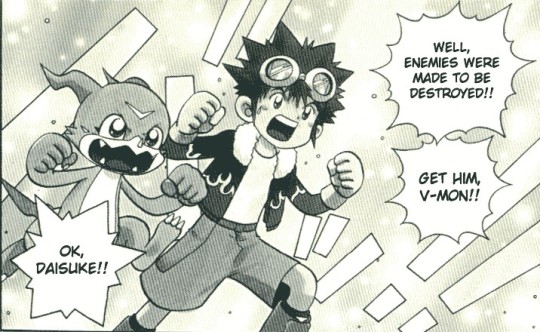
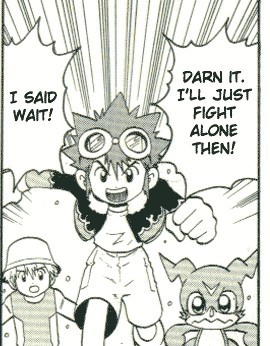
The issue here is that the whole plot of the chapter itself is based on the idea that Daisuke is the kind of person who likes fighting for the sake of fighting, and has an impulsive urge to charge in aggressively to the point of even looking down on his friends for denying him. Certainly, on the surface, it does seem to match up with Daisuke still having difficulties adjusting to these new kids being his friends at the beginning of the series, and generally having an abrasive, rough-around-the-edges personality, but...
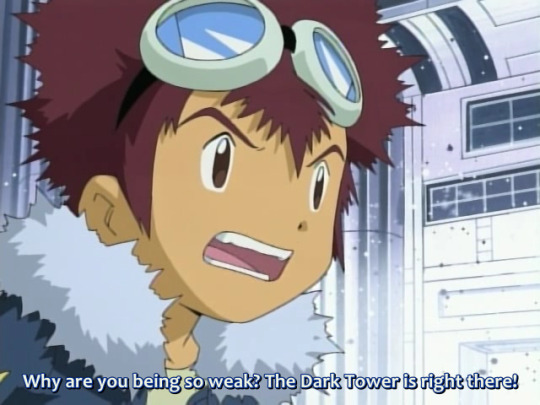
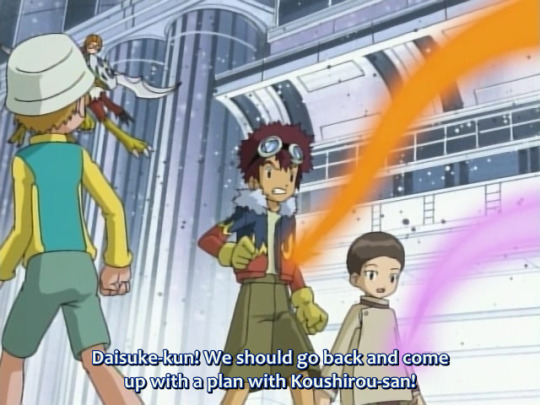

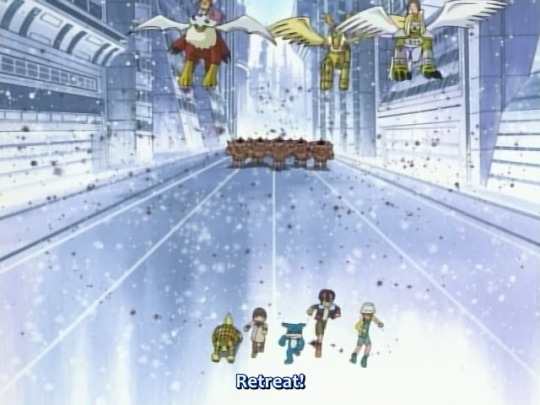
Ah.
The above screenshots are from 02 episode 7, which is a very early episode -- one that clearly takes place before Magnamon’s appearances in Hurricane Touchdown and 02 episode 20-21, and XV-mon’s appearance in 02 episode 22 -- and one that’s still part of Daisuke’s early bout of “shallow” episodes, in which he’s still instinctively lashing out at Takeru due to his perception of having something going on with Hikari. And while he does initially lash out at them for wanting to turn back, the moment everyone else makes a good case for them turning back (especially when their own Digimon run out of energy), he -- rather easily -- grits his teeth and actually calls the retreat himself.
On top of the fact that Daisuke is very capable of pulling back when he practically understands it’s necessary (even if he hates it), some important points need to be made about his behavior here: Daisuke does not push forward on fighting because he likes fighting and attacking things, but because he practically wants to see the Dark Tower destroyed (and the Dark Tower is causing problems for everyone everywhere right now). He hates the Kaiser, and wants to fight everyone under him, because he’s hurting others. Only one episode later, Daisuke vocalizes that he’s even okay with losing a soccer game as long as he gets to play someone who’s inspired kids all over the country and enjoy the match.
The other problem is that it actually implies that Daisuke would be able to do anything without his friends’ approval. Despite Daisuke’s ostensibly rough surface demeanor, he gets strung along easily. It is absurdly easy to shut him down or override his opinions just by being assertive enough. There’s a very good reason why he’s been described as “prevented from doing much in the first half”. Daisuke spends the first half of the series largely unable to make his own decisions because his friends keep making them for him, and part of his character development involves him becoming able to actually put his foot down and do what he wants when it’s something he cares about, which is something that very much does not set in until the second half.
In addition, the implication that Daisuke would be actively belligerent to the point of having the priority of “destroying enemies” instead of “helping others” is very contrary to the whole point of his character arc:
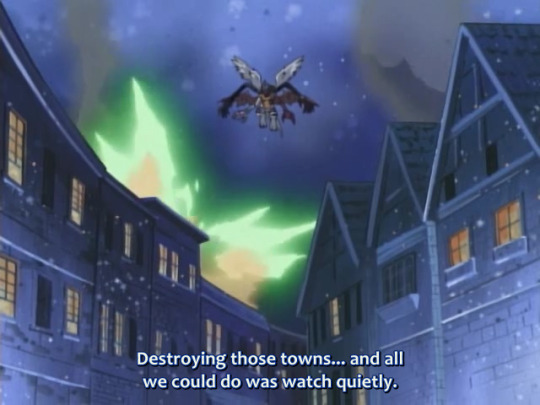
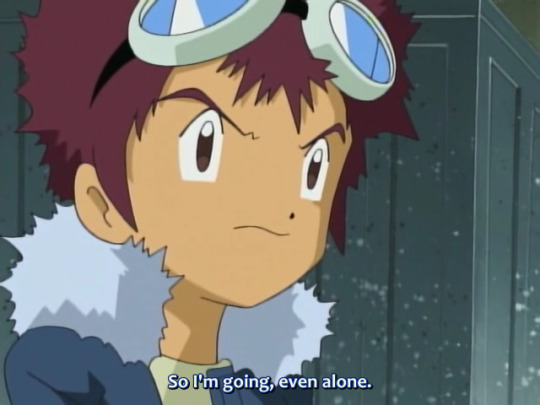
In 02 episode 20, the first time Daisuke does truly put his foot down against the wishes of the others in the group, it’s because seeing Chimeramon destroy so many things hurt him that badly that he hates sitting around and doing nothing. Again: Daisuke is a person who does things because he cares about and wants to protect others, not because he necessarily likes fighting. It’s also important that he makes this statement that he’ll go in “even alone” -- he does not look down on the others or show distaste for them for choosing to recuse, because they’re understandably exhausted, but simply says that he’s frustrated at the idea of giving up this one chance, and doesn’t want to squander it. (It’s also consistent with the way he treats the mortified Ken in 02 episode 48 -- he reminds him that Jogress won’t work if Ken’s not feeling up to it, and says that he’ll do it alone if he has to because something has to be done.)

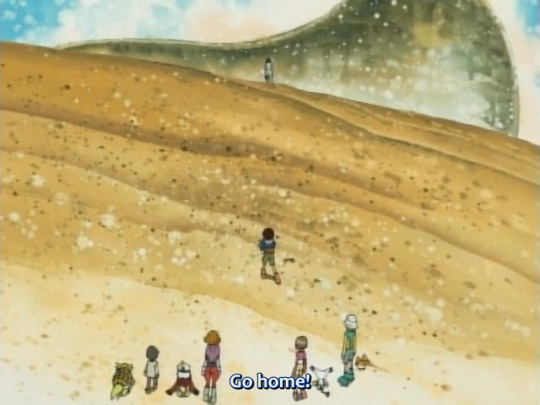
And speaking of Ken, this trait of Daisuke’s is why that whole character arc of him reaching out to Ken works in the first place! Because, again, Daisuke hated the Kaiser because he was doing horrible things. The moment the Kaiser stopped doing horrible things, Daisuke didn’t feel up to kicking him while he was down, actually urged him to do the first thing he could do to make amends -- “go home” -- and ultimately chose to reach out to him because he thinks in terms of moving on and creating positive things, not for destruction for the sake of destruction. Because Ken seemed to not be hurting anyone anymore, and he’s actually doing something to help, so why not believe in him and let him help?
Again: with the exception of episode 48 (which is just reinforcing something from before), all of these episodes are before XV-mon’s first appearance in 02 episode 22. Daisuke had always been this kind of positive and supportive person from day one; those traits had just not been very easily visible because he was still trying to deal with his initial awkwardness and being rather rough around the edges, but they’re still traits he’d always fundamentally had.
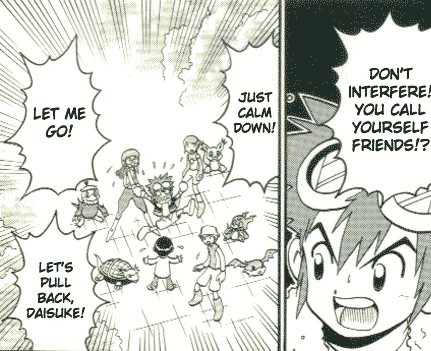
The chapter continues with Daisuke actually looking down on his other friends and protesting angrily against them trying to pull him back. Beyond the fact that (as stated above) the anime’s portrayal of Daisuke would make him very unwilling to fight back against opposition at this point of the series, the idea he’d actually be condescending about his friends is a little...hmm. Because, again, in 02 episode 7:

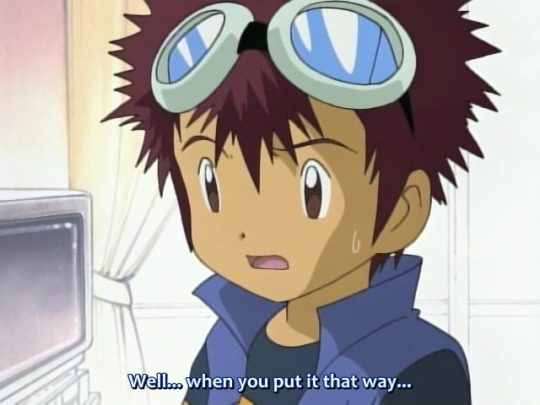

Daisuke does momentarily lash out at Iori and Takeru in a moment of emotional compromise when he’s stressed over Hikari getting trapped in the Digital World, but he actually takes it back. Incredibly quickly. He apologizes to Iori, and decides to not let Takeru put the blame on himself, even though his emotionally-compromised moment had initially gotten him to instinctively try to pin it on him. (Which is important because, yes, even when Daisuke’s inclined to lash out at Takeru for his perceived existing relationship with Hikari and be jealous of him, he still cares about Takeru himself to the point he doesn’t want him to load himself with the guilt.)
Daisuke’s brashness is portrayed during this early part of 02 as him very, very badly needing validation. This means that going out of his way to push aside the people he calls friends would be the last thing he wants to do, because he actually wants their approval, and for them to like him, and therefore he’s willing to apologize quickly and try to make amends because he plays badly with actual confrontation.
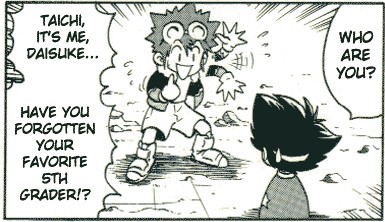
While this line isn’t quite off, it does rather clash with the way Daisuke actually portrays himself, which is that he doesn’t really have this much of an ego. The literal translation of this line is that he calls himself “your cute little junior”, but even the more liberal translation used here doesn’t quite work with Daisuke’s character, since it’s not implied at any point that Daisuke thinks Taichi actually cares about him back the way he adores Taichi.
Again, Daisuke is an extremely deferential person who craves validation, and this is especially in the case of Taichi, who arguably is the one who creates the easiest mood shift in Daisuke for the early parts of the series. Whenever Taichi is nearby, Daisuke immediately becomes deferential and respects literally everything he does.
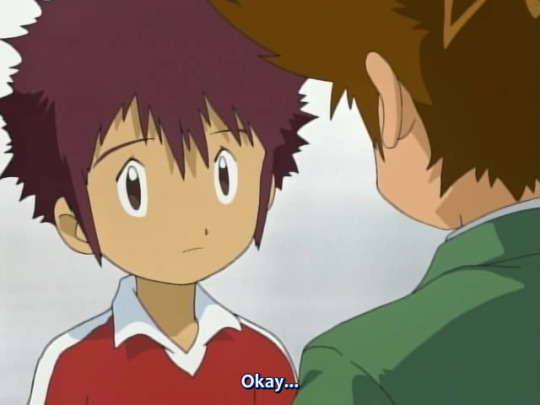
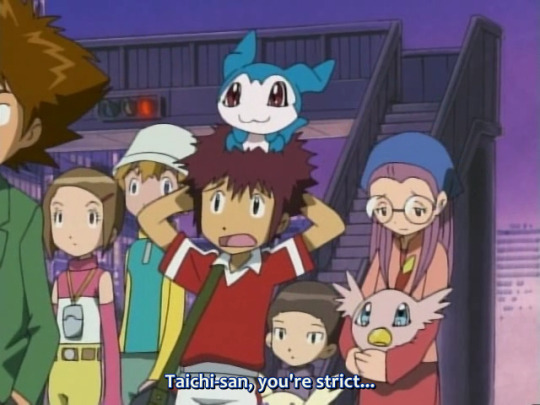

Observe Daisuke’s very resigned and very deferential facial expressions and attitude in 02 episodes 8 and 10, whenever it comes to Taichi (and note that the third screenshot here also comes from a situation where Daisuke wanted to advocate for pushing forward instead of retreating; it was that easy for Taichi to shut him down). For all it’s worth, Daisuke’s never really shown to have a lot of pride in himself (beyond the occasional joke), and it’s heavily implied that he sees Taichi as so amazing that he’s not even remotely in his league. That’s why it’s such a big deal that Daisuke puts his foot down and protests against what Taichi wants them to do in 02 episode 39, and it’s not even rudely or aggressively (he still uses polite Japanese!) as much as just firmly “I have a friend and I need to help him, I’m sorry.”
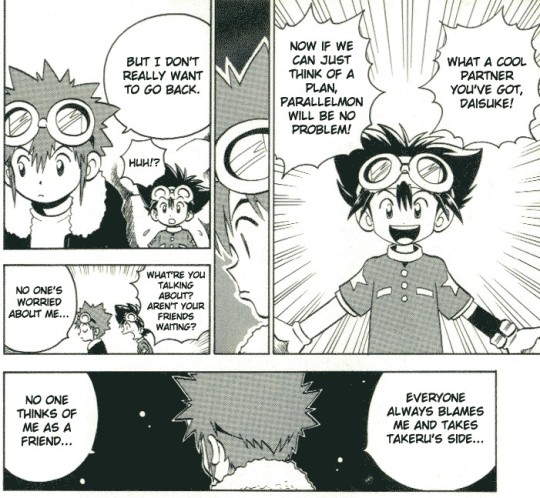
During the chapter, Daisuke claims that he doesn’t want to go back and meet his friends, because he doesn’t think they care about him, but, well, again: Daisuke is someone who craves approval. It’s somewhat understandable that he’d maybe have some degree of insecurity that they don’t like him as much as he wants them to, but the series by this point (remember, we’re talking episode 22, given XV-mon’s appearance) makes it very clear that Daisuke is well aware that his friends like him this much, and he has no real grudges against them.
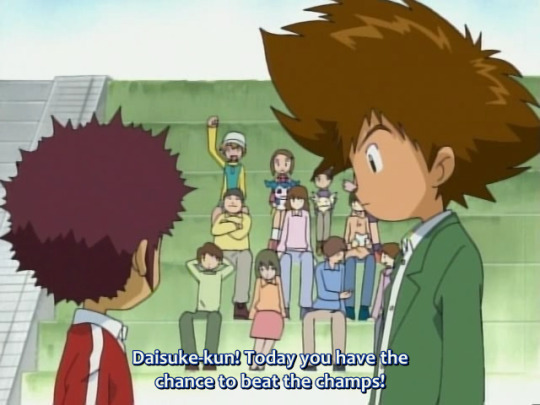
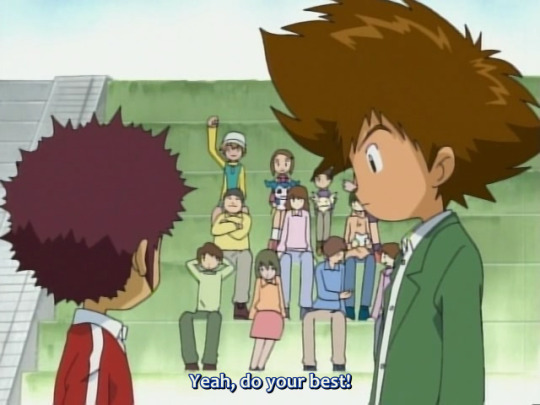

This is one of the reasons it’s so important that 02 had so many scenes of the kids just...bantering in the computer room, or having tons of “free time off hours” that had nothing to do with Digimon fights, because although Daisuke is brash and rough around the edges, otherwise, the group of friends here get along perfectly fine. Once the stress of fighting is removed, these kids are part of each others’ social circle and love hanging out for the sake of hanging out, and even someone as dense as Daisuke should know very well that they do at least like him this much.
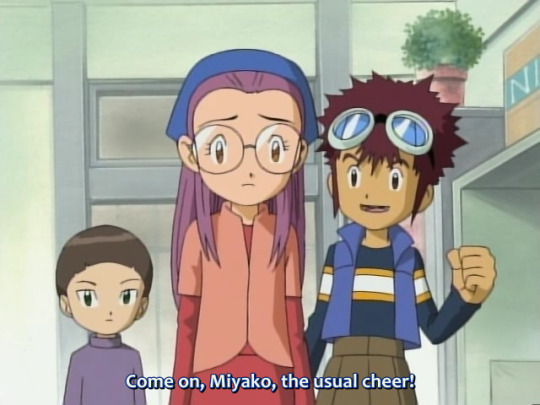


And, more importantly, whatever Daisuke might think about what his friends think of him, he himself likes them a lot. He cares about them a lot. Even all the way back in 02 episode 10 and 11, with Miyako and Takeru (whom he ostensibly banters and gets touchy with a lot), he still makes it clear he likes what Miyako’s doing and wants to check on her (without prompting), and later, when he gets in a fight with Takeru, he blames himself for not understanding Takeru’s feelings instead of feeling inclined to blame it on him. (In fact, this so-called hostility with Takeru is really overblown here, because there’s no reason Daisuke should think everyone takes Takeru’s side; when they did get in a fight in 02 episode 11, everyone was more concerned about getting them to calm down than they were about taking sides, because both of them did have a very reasonable position.)
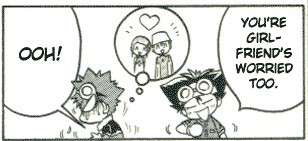
And while Daisuke getting set off by the Takeru and Hikari issue might have been in-character at one point, it’s not for him at this point in the series, because 02 episode 22, the very episode that introduces XV-mon, has him take a completely different view of the situation:

Daisuke had already gotten over a lot of it by this point. The last time he shows any indication of Takeru and Hikari having ~something going on~ to the point he suspects Takeru of being an obstacle is all the way back in episode 17, which oh-so-coincidentally happens to be the same episode where he later learns about the truth of his seniors’ great adventure in 1999, and therefore receives the full context of why Takeru and Hikari knew each other beforehand (which they had been absolutely terrible at elucidating for 17 episodes). By the time we get to this epsode, Daisuke does not hold anything against Takeru himself, and he doesn’t even accuse them of having a thing, just moping that they “get along so well”. He’s not angry about it, he’s sad about it, and it’s heavily implied that he’s really just sad about being third-wheeled more than anything.
It’s also important to realize that this is long past the point where Daisuke would have shown any outright hostility towards Takeru at all. At worst, he maybe scoffs “do whatever you want!”, or ends up a little sad that they’re leaving him out, but he ends up putting this on himself more than he ever lashes out at others about it anymore. The grudge against Takeru had already gone long under the bridge, by this point Takeru is just a friend that he likes reasonably well and is sad to be third wheeled by, and it’s only 13 more episodes before he’ll stop bringing his crush on Hikari into the issue for the rest of the series.
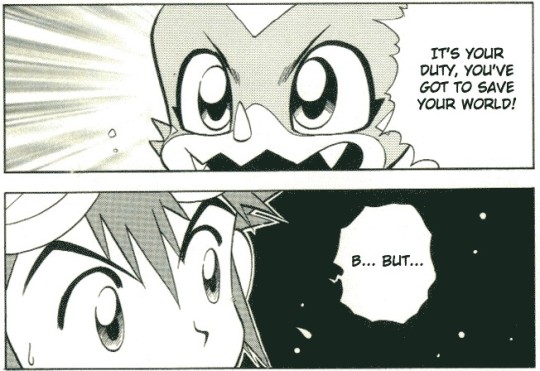
And, remember, Daisuke has always been someone who does things “because other people are being hurt”. He’s not actually that selfish! Whenever people are really in trouble, he goes in to help them -- remember, back in 02 episode 8, he was crushed because Ken turned out to be the Kaiser, and someone indirectly trampling on the dreams of all the soccer-playing kids in the country. Had this been Daisuke from the anime, he probably would have immediately wanted to go back the moment he realized there are people in need and hurt left behind, regardless of his own feelings on his relationship with his friends.
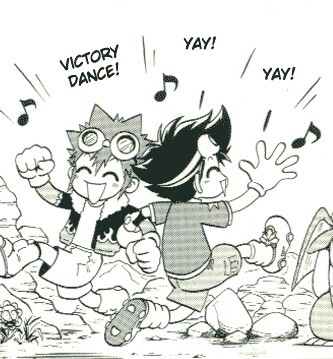
The rest of the chapter is fairly on-the-nose, with Daisuke managing to create a “miracle” through the power of his feelings by remembering what it meant for Taichi to give him his goggles, and for managing to connect to his friends despite them being trapped, with Daisuke and Taichi eventually parting on good terms and Daisuke even getting the honor of doing the victory dance with him. This is why I want to emphasize (I’ll say this in bold) that I do not think this is a “bad” chapter just because it’s not compliant with Daisuke’s anime characterization. Given what the chapter sets out to accomplish, setting up a story of someone who feels neglected by his friends and eventually decides to reach out to them with his own feelings, it’s thematically solid and well-plotted out as a story, and the crossover and thought experiment of how Daisuke would react to an alternate version of Taichi is very entertaining. Plus, Izawa’s writing and Yabuno’s art is charming, and it’s lovely to see the 02 kids in this style.
It’s just, well, the entire premise of this chapter relies on a conflict generated by Daisuke being a character he is very much not. And, again, it’s not something that I can really criticize Izawa and Yabuno for; Daisuke’s quite the deceptive character, and it really doesn’t seem like Toei and Bandai gave them a lot to work with, especially since this chapter only works within a very narrow range of 02′s timeline, between 02 episodes 22 and 25, when V-mon can evolve to Adult but Ken hasn’t formally joined the team yet. (And in fact, I’d generally apply this sort of caveat to things relevant to Daisuke that come from the Bandai side instead of Toei side; too many things out there seem to only really be working with the base details of “Taichi’s junior who has a crush on Hikari” with no regard to the actual nuances of his character.) Personally, it seems that Izawa and Yabuno did their best with what they had to work with, and they even made it a fun chapter while they were at it! -- so I would simply say that it’s probably best to enjoy this chapter without thinking about the lack of canon compliance too hard, but also not to judge the actual anime version of Daisuke too much by this portrayal.
#digimon#digimon adventure v tamer 01#digimon adventure 02#motomiya daisuke#daisuke motomiya#shihameta
53 notes
·
View notes
Text
53. “Were you ever going to tell me?”
Divergence AU Part V
Previous | Next (coming...soon) | AU list | Prompt source
Fanfic under cut
12/10
“Do you really think the others will be okay on their own?”
My question, although probably unnecessary, is a valid one. Queen, Noir, Panther, and Fox are going to deal with the IT president, while Mona, Skull, Joker, and I are going to find the third Will Seed that Mona sensed was nearby. I know that we only have a week left to secure the infiltration route, but the idea of us splitting into two different groups is a little concerning.
“Don’t worry, Crow,” Skull replies. “They got this.”
“They aren’t weak,” Mona adds. “That letter is as good as ours!”
“My apologies,” I say, adjusting my white gloves out of habit. Even if they know who I am and what I’ve done, Joker is the only one who has seen my other outfit. I shouldn’t care what they think of me, but I’ve kept it a well-guarded secret for so long. Force of habit, I suppose. “Shall we continue?”
Joker nods, taking my hand in his as he leads the way. He’s been doing this ever since that night in Leblanc. I’ve stopped questioning it after the first fifty times. It’s...nice. The rest of the thieves haven’t commented on it yet, nor do they seem confused. Maybe they already knew of Joker’s feelings.
The fight to get into the room is all too simple, largely in part due to Joker’s damn Shiki-Ouji, a Persona that I have come to despise. It, alongside Arsène and Jack Frost, is one of his main Personas. Shiki-Ouji, though, nullifies nearly all of Robin Hood’s attacks...as I found out the hard way during our duel last month. Not even Loki would have been much more help against it. That thing has become the bane of my existence.
I’m just glad Joker doesn’t see me as an enemy.
He leads the way back to the large double doors, slashing the rose vines with unerring grace before pushing the doors open. With this task done, the four of us enter the room. We’re greeted by harsh, indeterminate whispers. Their content means nothing to me-
“I trust no one but myself.”
I recognize that voice. Shido. I grit my teeth as his voice rings and echoes off the walls. The others don’t seem to notice, but it’s as clear as day to me. I tune the others’ voices out as Joker takes the Will Seed from its pedestal, straining to hear the inner thoughts of that bastard. For a few seconds, it remains incoherent whispers, until...
“The enemy is coming...in more ways than one.”
It takes nearly all of my willpower to not react to this. These are his inner thoughts, aren’t they? If that’s the case...could he know? Is Shido starting to realize the suicide-murder shtick was faked, that Ren is still alive and currently traversing his Palace? And...oh no.
In more ways than one.
That can only mean one thing...
Shido knows.
He knows I’m not on his side.
Or maybe it’s his normal paranoia? I can’t be certain. It isn’t like I can ask Shido himself. He’d lie and say he trusts me, the action almost as natural to him as breathing. If he does know, what am I supposed to do...?
“Hey, you okay?”
Mona’s query snaps me out of my thoughts. “I’m fine,” I easily lie. “Just a little nervous, I suppose.”
Skull, the dense idiot that he is sometimes, buys it. “Man, you looked like you’d just seen a ghost! Warn us next time, will ya?”
“I will,” I respond, looking at the others to gauge their reactions. Mona doesn’t seem entirely convinced, but it doesn’t seem like he’s going to probe further. And Joker...I can’t read him. All I get is the feeling that he sees through my lie. “Anyway, we have the Will Seed. What’s our next move, Joker?”
Joker thinks for a few moments before answering, “There’s nothing else here. Let’s meet up with everyone in the safe room.”
His hand slips back into mine as we leave the room behind us. This close to him, I can finally see that he wasn’t convinced in the slightest. I know he’d try to get me to open up to him if it weren’t for Mona and Skull. Despite this, his eyes plead with me under his mask, trying to get me to tell him what’s wrong. I refuse to look at him as the last statement I hear from that cursed room echoes in my ears:
“The only thing you have to do is follow my order.”
We arrive at the safe room to find the others already there. “How did it go?” Queen asks as Skull and Mona sit down. I choose to stand a little way back from the group, side-eyeing Joker as he rests his head against my shoulder. What does he think he’s doing? Judging by the cheeky smirk on his face, he’s trying to be as distracting as possible.
“Joker got the last Will Seed!” Mona replies, simultaneously answering Queen’s question and taking my attention away from the menace next to me.
“Aw yeah, and we got the fourth letter!” Oracle says. She is beaming as she holds up the envelope for everyone to see, apparently proud of her group’s accomplishments.
“Sweet!” Skull exclaims. “All that’s left is the cleaner dude! Let’s go find him and kick his ass!”
“Wait!” Panther interjects. “We don’t even know where he’d be.”
“Who cares? Can’t we just cause some trouble again?”
“We could, but...”
“Then-”
“As much as I would like to take the cleaner down now, we should wait,” I say before Skull can get another word in edgewise. “He’s stronger than any of the VIP’s we have fought so far.”
“How about tomorrow?” Noir chimes in. “It’s Sunday, so we won’t have school.”
“I agree,” Queen adds before looking at me. “Will you be joining us?”
I wish I had more time to think things through. If only we could wait a few more days. Time, however, is in short supply. “I should be able to, though if anything comes up, I’ll let Joker know,” I say while gently pushing Joker’s face away.
That smirk from before fades away, replaced with a carefully crafted neutral expression. His voice rings with authority as he says, “Sounds like a plan. We’ll meet up tomorrow afternoon.”
Tomorrow afternoon. That’s when the deed will be done. If my revenge plan is going to work, I’m going to have to kill him, for real this time. There’s no going around it. My mind is so preoccupied with planning how to accomplish this that I don’t even notice everyone else has left until I’m startled out of my thoughts by the kiss Joker plants on my cheek. He looks concerned. “Is everything okay?”
“What makes you think it isn’t?” I ask back, dodging his question.
“You seemed tense earlier. And a little scared. Are you sure you’re okay?”
“I’ll be fine. Soon, this will all be over.”
Over in ways neither of us would want, yet it’s the only way this could ever end. This is how it was meant to be from the beginning: with one of us dead.
12/11
I tap my fingers idly against my leg as I wait on one of the catwalks in the engine room. Earlier, I had texted Ren saying that I would be running late and to go on without me. He must have bought it because when I had entered Shido’s Palace, the Phantom Thieves were nowhere to be found. I had told them the cleaner would likely be in the engine room. They must be farther inside.
My suspicions are confirmed a moment later when the group comes walking out, celebrating their recent victory. How delighted they must be now that they have the final letter. That happiness is about to be destroyed. Joker is the one to notice me, of course. He halts, looking up at me. “Crow?” he asks. “What are you doing up there?”
I leap down, doing a flip before landing effortlessly in front of the thieves. Damn Joker’s habits rubbing off on me. I expect to feel some level of anticipation, or maybe regret, but I feel...nothing. I don’t see Ren or Joker in front of me. All I see is another obstacle, blocking my plans from coming to fruition. “Did you really think I would let you leave this place alive?”
“Huh?”
My gun is out, pointed at him in an instant. I won’t give Joker the chance to say another word. Time to pull the trigger.
...except I don’t.
What’s stopping me from firing, from killing this menace? My hesitation wastes valuable time, time that the rest of the thieves use to prepare themselves to fight if necessary. I no longer have the advantage of surprise. Why didn’t I just kill him first? “Keeping you alive was a terrible decision.”
“What’s gotten into you, Akechi?” Queen asks. I don’t miss the dropping of codenames. “You were the one who suggested this plan.”
She’s not wrong. I had been the one to plan most of this heist, due to my knowledge of Shido’s Palace. “Nothing has changed. This camaraderie between us has all been an act.” The lies slip so easily off my tongue, and I find that I’m starting to believe myself. “When Joker started to piece things together, I knew I would have to change my plans, and in order to do that, I had to make him aware of my original plan. I’ve been planning this from the start. You all were simply so foolish as to trust me.”
“All an act...?” Joker asks, hesitant. It’s as if he’s trying to deny the words I’m saying.
I refuse to answer his question, instead deciding to say, “I’ve never shown you my true power, have I? Here, I’ll show you...while you die. Persona!”
I can feel Loki’s presence as two Shadows materialize from thin air. A Cerberus and a Cu Chulainn. Perfect. I direct Loki to use his signature Call of Chaos on the two Shadows. Their complexion turns black and red as their true destructive potential is unleashed. I can hear Cerberus growl as it paws at the ground in anticipation, waiting for my command to kill these wretched thieves.
“What was that?” Oracle asks, voicing everyone’s surprise at Loki’s brief appearance. “That wasn’t Robin Hood.”
“You’re right,” I confirm with a grin, “but that’s the least of your concern. You better not underestimate these two.” I leap back, putting the berserk Shadows between me and the Phantom Thieves. In a mad rush, the two Shadows launch themselves at their foes. I don’t expect the Shadows to win; they’re just meant to wear the enemy down.
Mona’s voice rings over the din of the fight. “Go, Joker! If anyone has a chance of getting through to him, it’s you.”
I see Joker nod, and, before I can even react, he’s using his grappling hook, sailing over the Shadows and landing a few feet away from me. The absolute fool. “You just made a grievous mistake,” I snarl. “You’ll need your teammates if you have any hopes of defeating me.”
He shakes his head. Cocky little shit- “I don’t need to defeat you.”
That catches me off guard. Just what the hell is he planning? “Then what is it? Are you going to abandon your teammates, just like you wanted before when I suggested leaving them to work with me?”
“I’m not abandoning anyone.”
“Oh, is that so? Then maybe we should put an end to our duel, striking and striking again and again until one of us is dead! Unless you’re so spineless that you’ll run away with your tail between your legs. Is that your master plan?”
“No,” he replies, his voice firm. “I love you, and I’m not leaving you.”
I laugh. He’s more foolish than I gave him credit for. “Then tell me, Joker. Will you love me for this?” His eyes widen ever so slightly as I point my gun at his face, aiming right between his eyes. It’s a pale comparison to the terror Sae’s cognition of Ren expressed. He’s too naive to be afraid. “There’s no cognitive double to save you this time.”
Joker, the absolute idiot that he is, doesn’t have the common sense to back down. Why is he just standing there? Move, damnit! It’s as if he’s deaf to my silent pleas. He refuses to move. He even has the gall to smile a little as he replies, “Hey, I’ll always love you no matter what. I’ll take a bullet for you, even if you’re shooting.”
I could do it. I could shoot him right now. But now, in this critical moment, I find myself hesitating once again.
Do it.
But he’s the only good thing in my life-
Do it! Watch as the light leaves his eyes!
I don’t...I don’t know if I can do it again...
What about your revenge? He’s in the way!
I tighten my grip on the gun...but I still can’t pull the trigger. Why...why can’t I kill him!? “How stupid are you? Would you really let your irrational feelings get in the way of your goal?” I have no idea if I’m asking him the questions...or myself.
“It seems you let your ‘irrational’ feelings get in the way of your goal. Aren’t you going to shoot?” he adds, almost sounding a little cocky at the end.
How dare he...
“Don’t lecture me!” I yell, whipping the gun away from his face. It clangs against the floor, the sound echoing in my ears. It’s clear I’m not going to shoot him point-blank anyway. “You think you know me, that you’ve got me pinned down. You don’t know anything about me! All you are is some criminal trash living in an attic who thinks he’s in love with an ace detective, a celebrity! You’ve deluded yourself and refuse to see the truth. How foolish you were to think that you meant anything to me, Joker!”
“You’re wrong!” He grabs my hand, the same hand that a few moments prior had been pointing a gun at his face. “I love you, and I’ll always love you. And...I know you love me too. We don’t have to fight-”
“I will get my revenge,” I interrupt as I pull my hand out of his grasp, refusing to listen to another word of his, “against Masayoshi Shido...my father. And you’re in my way.”
That makes him stop. The shock on his face is undeniable. “Shido’s...your father? Were you ever going to tell me?”
“What would’ve been the point?”
“Goro,” he starts; he must be taking this seriously if he’s using my first name, “we can still change his heart. Just let me hel-”
“I’m warning you. Stand. Down.”
“Please. I love y-”
Something inside me snaps. “NO! Just shut up, and die, Joker!”
There is only one way I can think of that’ll make me able to kill Joker. I welcome it with open arms. Loki’s mad power washes over me, my outfit changing in an instant. The world is tinted red, though I’m not sure whether it’s from the intense desire to murder or the lenses in the black mask. Maybe both.
But that doesn’t matter.
Nothing matters.
The only thing I want is to kill!
Destroy!
Massacre anything that stands in my way!
...starting...with...Joker.
A lopsided grin creeps on my face. Oh, this will be fun! I wonder how far I can go with this...
Let’s find out.
With little abandon, I rush straight at Joker with my serrated blade. It’ll tear him into pieces!
My sword clashes against his signature dagger. Somehow, he stands firm. How? How can he...?
Oh, so what!? He can’t possibly last for long! I go for another slash, but he yet again blocks it with that damn dagger of his. Our blades continue to strike against each other, neither of us able to land a hit on the other.
Again.
And again.
And again!
But then, as I throw all my strength into another frenzied slash, he weaves out of the way, kicking the sword right out of my hand as I start to stumble.
No way. How could this attic trash possibly be stronger than me!?
Joker lunges at me, the dagger no longer in his hand. Somehow, he manages to knock me off balance. He tries to restrain me as I thrash while screaming insults at his face.
One of my hands reaches my mask. Perfect.
I don’t even think.
I just act.
Only one thought rages in my mind.
I will kill Joker!
I command Loki to use Maragion. He won’t be able to block this attack. Screw his Shiki-Ouji!
For a brief moment, the flames surround Joker...but suddenly, they turn on me. I grit my teeth at the searing agony radiating through my body. Damnit...of all the times he wasn’t using that Persona-
My mask reforms, but is quickly pulled away from my face. Joker tosses it to the side, once again trying to hold me down. He flinches as my claws rake across his face, but he doesn’t budge.
He’s saying something to me, but I can’t hear him.
I don’t care what he’s saying! He should be dead!
I almost manage to hit him a second time, but now he’s able to use his hands to pin mine down. I try desperately to claw at his hands, but they’re just out of reach.
Damnit!
Joker’s still talking. Now I can make out his words. “...love y...please...it’ll be...”
What is he thinking!?
Even now...
As the seconds slowly tick by, the psychotic rage that overtook me starts to dissipate. Joker keeps on saying the same thing over and over: “I love you, Goro. Please, calm down. It’ll be okay.”
Over.
And over.
He sounds so distraught as I continue to fight against him. Repeating those same words. It’s no use. Joker’s determined to stop me.
Eventually, I stop struggling, panting as I try to catch my breath. I finally manage to gasp out, “What are you doing?”
“Shouldn’t I be asking you that?”
“I...I didn’t want this.”
“I know. You didn’t want to shoot me.”
“I-”
Our conversation is interrupted by a pained scream. We both look over as Cu Chulainn falls to the ground. Cerberus must have fallen earlier in the fight, as it’s nowhere to be seen. The rest of the thieves look a little tired but otherwise no worse for wear. I turn my attention back to Joker, frowning as I see blood dripping from the thin slashes marring his beautiful face. “It’s fine,” Joker says, noticing where my attention is. “It doesn’t hurt. But are you okay?”
My laughter is strained, forced. “That’s what you’re concerned about?”
“But you got hurt.” He moves his hand to gently caress my face. “If I had known you were going to use that move, I would’ve used a different Persona.”
“Why would you even care? I just tried to kill you, damnit!”
“Because I love you, Goro. And I always will. You could’ve shot me, and I still would have loved you just the same.” Is it just me, or did his voice crack just a little there? “Goro, no matter what happens, I just want you to know I love you dearly, and-”
“Ugh, can we save the cheesy romance for later?” Oracle butts in.
Oh. That’s right. We’re not alone here. And with how things currently look... “Joker?” I start.
“Yeah?”
“Get off me.”
“Aww, I was enjoying this,” he says with a chuckle. He waits a second before moving so that I can push myself into a sitting position. The sudden movement causes me to hiss in pain. “You didn’t answer me earlier. Are you okay?”
“I have been through worse.”
“That doesn’t answer my question.”
“I’ll be alright. Any other questions before we leave this wretched place?”
“Just one. Why did you do this? Did something happen yesterday?”
I almost tell him. My lips part, about to answer, but I realize it might take too much time. “How about we save that question for Leblanc? It...might take some time to answer.”
“Okay. We should head back to the central hall,” he adds, addressing everyone with that. He then turns back to me and, with a smirk, kneels down and puts one arm behind my back and the other under my knees. I realize what he’s doing just as he proceeds to pick me up bridal style with little regard for if he gets jabbed by the pointy parts of my true outfit. The rest of the thieves seem just as surprised and shocked as I am. Meanwhile, Joker grins at me as he says, “Hi, Akeppi.”
“Joker, what are you doing?”
“Showing you how much I love you.”
“You stupid, insufferable-” The rest of what I was going to say is cut off by the soft little kiss Joker gives me. He looks like he would love to kiss me more, but he’s not about to test his luck when I have so many ways to potentially harm him right now. It takes me a few seconds of mulling my response in my head before I begrudgingly finish, “...lovable menace.”
“I know. But I’m your menace.”
That alone gets me to smile. He’s right. It only took me trying to kill him to see it. “Yes, you’re my menace, and nothing is going to ever change that.”
#i apologize for how long this got#my writing got away from me#akeppi writes#p5#persona 5#goro akechi#akechi#ren amamiya#akira kurusu#akeshu#shuake#writing prompt
18 notes
·
View notes
Text

| continued from x @hewmanyfoemen
Ivy had never been like many others in this realm. Unlike most, there was only a select few people that she truly cared about. So few that Ivy could count them upon her fingertips. People were destructive. They ruined the environment and killed the herbal life that thrived in the the planet. They were greedy and wanted nothing but the things their hearts could create. That was the thing, Ivy wished to never be like them. She wished to never experience those things again. Not like how her father used to and the way he had showed such actions. She closes her eyes for a moment, needing to steady herself and where she stood. The memories came on too strong and she had forgotten how to lock them away for a split second. The grass tickles against the skin of her ankles as it grows slightly to creep up underneath the end of her pants. Such a sensation brings a soft smile to her lips and when her gaze drifts open again, she looking at Tsuki with a kind expression. Ivy had never really had to deal with an android before. She tended to work alone in Gotham. Her heists had always been in line with the goal she had in mind, so what was the point in dragging others into it? Even Batman worked alone until Boy Wonder came along. The words slip from her lips with mild ease. Something she knows to ask someone else even if the care for the person isn't really there. Was Tsuki technically a person? Sure. She spoke, had thoughts and reacted just like everyone else, even if it was all really coding. So did it matter to Ivy if she had shown concern to someone who was an android and not technically a human? Would be the same if someone from the outside had seen how she had treated plants and trees and all other manner of the Green? Questions swarm her mind and she wants to snap, but instead, she shakes her head, gaze staying steady on the other before drifting down to the robotic arm.
Ivy was no engineer but she was smart. A doctorate in her own accord, Ivy could figure out most things had she tried hard enough, but this was a difficult subject entirely. Mechanical things weren't the botanist's field of study. Batman had taught her nothing with the different mechanics he used on his suit. The one superhero that used his brain to survive in a world full of villains'. "Yeeeahh, by the looks if it, your sensors may be lying to you. Did you not see the blow that you just took to the arm? Good thing you're an android, I guess." Her eyebrow raises a little at the other and she kneels down next to her. Ivy had sustained many injuries over her life, all of which had been healed due to the way her body was with the Green now, but she was unsure about this sentient being in front of her. How did one fix a mechanical arm when their expertise lied elsewhere? Who had been Tsuki's upkeeper and could Ivy get her there safe enough? "No offense or anything, but I really only care about like three or four people." The red head states lightly, a bit awkwardly but she's never been a good liar so why start now? She shakes her head, standing back up as she offers Tsuki a hand to help her to her feet. "I may be used to working alone, but I'm not dumb enough to think I can make it through this mission on my own. We have to work together, Tsuki."
2 notes
·
View notes
Text
Skip to main content
DONATE

Mother Jones readers and reporters are rising to the challenge every day. If you can, please consider supporting essential journalism during this crisis.
Donate
CORONAVIRUS
16 MINS AGO
Will Trump and His Enablers Ever Face Accountability for the Coronavirus Massacre?
The Iraq War is not a good precedent.

DAVID CORN
Washington, DC, Bureau Chief
Bio | Follow

Mother Jones illustration; Oliver Contreras/CNP/Zuma; Getty
For indispensable reporting on the coronavirus crisis and more, subscribe to Mother Jones' newsletters.
They misrepresented the threat. They disregarded experts. They did not prepare adequately. And thousands of Americans died.
And they got away with it.
The implementers, cheerleaders, and enablers of the catastrophic Iraq War were never punished for their actions. It’s not too early to wonder if Donald Trump and those who joined him in discounting and downplaying the coronavirus threat or who were part of his lethal mismanagement of the crisis or who echoed his false statements and absurd claims of winning will ever pay a price for conduct that has led to a current death toll of 12,000, which could end up a magnitude of order greater.

Advertise with Mother Jones
The Iraq War and occupation, a strategic blunder of historic proportions that was mismanaged from the start, caused the deaths of almost 5,000 US service members and about 200,000 Iraqi civilians. And it was all for naught. There was no WMD threat to neutralize. The invasion did not remake the region and spread democracy. It wreaked chaos and violent instability that continue to plague Iraq and the world.
Yet the architects and engineers of this epic disaster never faced a reckoning. George W. Bush and Dick Cheney were reelected, and after their second term was done, they were rewarded with lucrative book contracts, as was former Defense Secretary Donald Rumsfeld. Paul Wolfowitz, the assistant secretary of defense, became the president of the World Bank. Bush went on to become a pal of Michelle Obama. Ari Fleischer, Bush’s press secretary, was hired as a media consultant for the NFL. National security adviser Condoleezza Rice returned to academia and public speaking and served on the college football playoff selection committee. Columnists who championed the war—Thomas Friedman, David Brooks, the editorial writers of the Washington Post and the Wall Street Journal—kept their prestigious and well-paying jobs. The dogs of war who howled on Fox News and within the conservative media were not punished. Sean Hannity, a month before the 2003 invasion, declared, “We’re going to go in and we’re going to liberate this country in a few weeks and it’s going to be over very quickly…We’re going to find all of the weapons of mass destruction.” Today, Hannity is the biggest, highest-paid loudmouth at Fox. Democratic legislators who voted in 2002 to provide Bush the leeway to launch the war were not banished. Two won their party’s presidential nomination (John Kerry and Hillary Clinton), and a third (Joe Biden) is on his way to do the same.
There has never been true accountability for this massive screwup that cost thousands of Americans their lives.
Will that happen again?
It is undeniable (for any reality-based observer) that Trump botched the response to the coronavirus pandemic. A recent Washington Post article depicted this tragedy of incompetence in painful detail. And Twitter is loaded with videos showing Trump repeatedly uttering false statements, discounting the coronavirus threat, and claiming the virus was contained. For weeks, he conveyed the message that there was nothing to worry about. He was late to accept the need for social distancing and did not encourage governors to implement necessary shutdowns. He claimed a national testing system was about to start. It never happened, and his administration has failed to develop wide-scale testing. He did not move quickly to prepare health care workers with needed personal protective equipment and ventilators. He essentially told governors they were on their own.
SIGN UP FOR OUR NEWSLETTERS
Subscribe and we'll send Mother Jones straight to your inbox.
EmailSign Up
The most recent of all the revelations showcasing Trump’s ineptitude was especially stark. In late January, White House aide Peter Navarro sent Trump a memo noting, “There is an increasing probability of a full-blown COVID-19 pandemic that could infect as many as 100 million Americans, with a loss of life of as many as 1-2 million souls.” The warning never registered with Trump.
There has been an endless series of profound errors committed by Trump and his administration prior to and during this horrific crisis. Then–national security adviser John Bolton shut down the White House’s global health security office in 2018; the Trump team ignored a pandemic playbook left for it by the Obama administration. And Trump, the malignant narcissist, has, to no one’s surprise, explicitly rejected all responsibility for the glaring missteps and deadly miscalculations. Instead, he has boasted about the ratings for his daily press briefings.
Trump and adoring sidekick Mike Pence will face a moment of judgment in November, when voters will render a verdict. But what of all the others who helped make this moment of mass-death possible? The Dear Leader crowd that supports Trump no matter what has echoed, protected, defended, and bolstered him as he has guided the nation into a nightmare of economic calamity and rampant death. You know who they are. (If not, watch this.) White House advisers Kellyanne Conway and Larry Kudlow—who each will likely look for remunerative gigs after their time with Trump—both claimed the coronavirus was “contained.” Trump’s newly acquired press secretary, Kayleigh McEnany, proclaimed in February, “We will not see diseases like the coronavirus come here..and isn’t it refreshing when contrasting it with the awful presidency of President Obama.” Rush Limbaugh told his millions of Dittohead listeners that the coronavirus was no worse than the “common cold.” (Should he give back the Medal of Freedom Trump awarded him in February?) Numerous Fox-heads, including Hannity and Laura Ingraham, misled the public, reinforcing Trump’s insistence that the threat was a hoax and discounting the seriousness of this virus. Only Trish Regan was booted by Fox after she derided what she called the “coronavirus impeachment scam.” The others have remained in place.
Then there is the Republican Party. None of its leaders have dared to challenge Trump, as he misrepresented the threat and lied about his administration’s response. Rep. Devin Nunes (R-Calif.) encouraged his constituents to ignore calls for social distancing and to go to restaurants. Rep. Matt Gaetz (R-Fla.) mocked concerns about the virus by wearing a gas mask on the House floor. Senate Majority Leader Mitch McConnell (R-Ky.) and House Republican leader Kevin McCarthy (R-Calif.) never publicly questioned Trump’s multiple blunders, and they continued to lead their party in a cultlike manner of total obeisance to Trump. Many others share the blame. Conservative and right-wing evangelical leaders, including Jerry Falwell Jr. of Liberty University and Matt Schlapp of the American Conservative Union, reinforced the no-big-deal theme that was pushed by Trump’s White House and have considered Trump faultless.

Advertise with Mother Jones
So with thousands of Americans dying in part because of Trump’s feckless and reckless response, who will be held responsible? Rep. Adam Schiff (D-Calif.), who prosecuted the impeachment case against Trump, has proposed creating a coronavirus commission like the 9/11 commission that investigated all the mistakes and misconceptions that preceded that horrible attack. The 9/11 commission produced a detailed and elegantly written report that offered a stunning indictment of the Bush-Cheney administration and the US intelligence community. (Still, Bush and Cheney were reelected.) But one can expect Trump, the Republicans, and their amen choir to rabidly oppose Schiff’s idea (as Bush opposed establishing the 9/11 commission).
American society does not do accountability well. The instigators of the Iraq War did not suffer. Nor did the bankers who crashed the US economy in 2008. We do have elections, and Trump, Pence, and their Republican handmaids will be on the ballot in seven months. But what of the Fox barkers, the conservative movement that has become no more than a promotion vehicle for Trumpjackery, and the entire right-wing noise machine? With their obsessive devotion to Trump, they all have helped pave the way to a national massacre. Will they be able to wash the blood off their hands? Can a large and deplorable slice of the national political media apparatus be judged guilty of murderous culpability and locked up (metaphorically)?
“Nations should have memories,” Frederick Douglass once said. But Gore Vidal frequently referred to the “United States of Amnesia.” And the past is not a good prelude for accountability. Too often the culprits who contributed to death and destruction end up skating along, even experiencing personal benefit. At this moment, the priority for the nation is to rise above Trump’s incompetence and contend with a killer virus that is robbing us of our friends, neighbors, and loved ones and causing severe economic and societal dislocation. But there ought to come a time for a tallying: who did what when, during a life-and-death national crisis. And it is not too early to be collecting receipts. None of this should be forgotten.
FACT:
Mother Jones was founded as a nonprofit in 1976 because we knew corporations and the wealthy wouldn't fund the type of hard-hitting journalism we set out to do.
Today, reader support makes up about two-thirds of our budget, allows us to dig deep on stories that matter, and lets us keep our reporting free for everyone. If you value what you get from Mother Jones, please join us with a tax-deductible donation today so we can keep on doing the type of journalism 2020 demands.
Donate
More about:CoronavirusDonald Trump
RELATED

“Like a Used Rag That Was Thrown in the Trash”: Coronavirus Comes for Domestic Workers
FERNANDA ECHAVARRI

The Acting Secretary of the Navy Just Resigned
DAN SPINELLI

Trump Declares War on Watchdogs
DAN FRIEDMAN

How Republicans Exploited the Coronavirus to Steal a Wisconsin Election
ARI BERMAN

Advertise with Mother Jones
WE RECOMMEND

WhatsApp Takes Steps That Could Slow the Spread of Coronavirus Misinformation
SINDUJA RANGARAJAN

Here’s Where the Demand for Guns Is Soaring
JULIA LURIE

Exclusive: Elizabeth Warren Has a Plan to Protect Your Right to Vote From the Coronavirus
ARI BERMAN

What Do the Cast of “Hamilton” and Jim Halpert From “The Office” Have in Common?
DANIEL KING

Advertise with Mother Jones
LATEST

Trump Fired a Government Watchdog for Doing His Job. Congress Isn’t Stopping Him.
DAN FRIEDMAN

My Father Was the First Federal Prisoner to Die of COVID-19. He’d Been Trying to Get Out for Years.
CHRISTOPHER WALKER AS TOLD TO SETH FREED WESSLER

It’s Hardly Shocking the Navy Fired a Commander for Warning of Coronavirus Threat. It’s Part of a Pattern.
T. CHRISTIAN MILLER AND MEGAN ROSE

The Elizabeth Warren of This Recession Is…An Elizabeth Warren Staffer
KARA VOGHT

Advertise with Mother Jones
We have a new comment system! We are now using Coral, from Vox Media, for comments on all new articles. We'd love your feedback.
VIEW COMMENTS
Independent. In print. In your mailbox.
Inexpensive, too! Subscribe today and get a full year of Mother Jones for just $12.
Subscribe
 April 2020

Smart. Fearless. Audio.
It's us but for your ears. Listen on Apple Podcasts.
Subscribe »
Looking for news you can trust?
Subscribe to our free newsletters.
EmailSign Up
ABOUT
Our Staff
Financials
Jobs
Events
Contact Us
SUPPORT
Ways to Give
Advertise With Us
Store
SUBSCRIBE
Magazine Subscriptions
Give a Gift Subscription
Email Newsletters
Podcasts
Customer Service
Copyright © 2020 Mother Jones and the Foundation for National Progress. All Rights Reserved.
Terms of Service Privacy Policy


2 notes
·
View notes
Text
Lysandre is actually a really scary villain if you think deeply into the premise of his character.
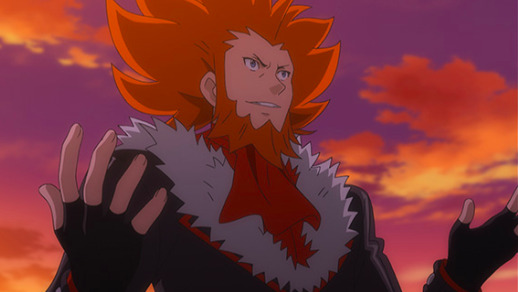
I’ve done a little bit of research on him already and have analyzed some theories + “evidence” that crosses between the games, the manga, the specials and the anime and, honestly, Lysandre is actually fucking terrifying if we assume his true personality is an amalgamation of all his counterparts.
I mean, for one, he’s really good at manipulating people. You can see this in a lot of ways but the most noticeable one is convincing rich people to buy into his weird-ass genocidal organization. Just thinking about that alone boggles the mind a little because he’s managed to get people to spend millions alone on just getting just a fancy suit and a “promised place in utopia”.
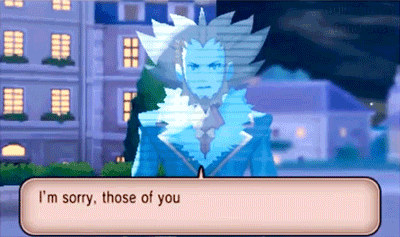
For two, Lysandre has a lot of control over the Kalos region, more control than anyone should be allowed. Literally let me exist the examples of how much control he has:
1.) Lysandre has control Lysandre Labs - a company that literally doles out all of Kalos’s most advanced technology (a la Pokemon Generations episode 16) - and has made it so that many people likely depend on his services. And, as mentioned in the manga (though I don’t know if this is a games-related factor but I would assume so) Lysandre is a brilliant engineer who’s come up with a lot of this amazing technology, putting him in a place of power through his skills alone.
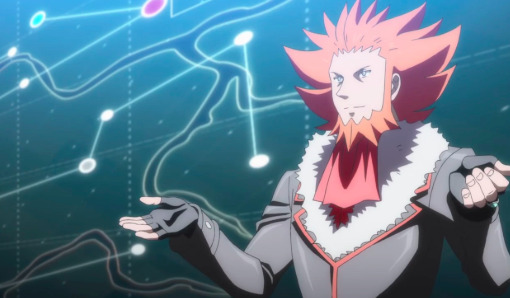
2.) Lysandre is friends with the Kalos region CHAMPION and REGIONAL PROFESSOR. He literally has them both admiring him and respecting him - a feat usually only reserved for the player character. And yet, all the while, Lysandre is using and abusing Sycamore’s and Diantha’s trust in him to do terrible things. So much so that Sycamore even admits in the games of how he was aware of Lysandre’s wrong-doings but was unable to stop him.
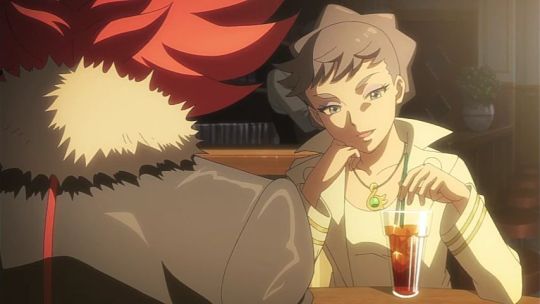
3.) Lysandre has control over the news media. This is pointed out in the games, in the manga, in the anime, and in the Pokemon Generations anime. And, the consistency is really appreciated because this is fucking scary. Lysandre has the ability to control how people see him through the news outlets. By using Malva - who broadcasts news to most of Kalos’s people - as a biased outlet meant to make him look good, Lysandre can easily spread lies and deceit to get people to respect him.
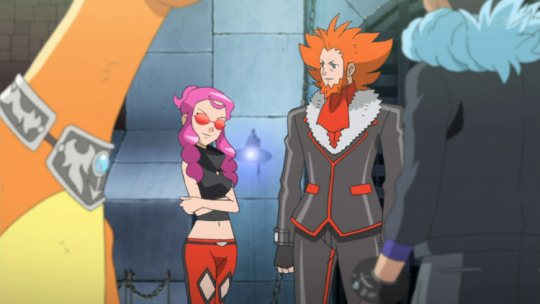
4.) I don’t really think this has to be said but Lysandre is very charismatic and a convincing actor. Even if you pinpoint him as the villain early on thanks to his garish design, it’s hard not to notice how everyone is in awe of him or how no one questions his motives. Lysandre is good at being liked, strangely so, and even if you feel an urge to hate him as the player character it’s hard not to notice the way many people in-verse treat him as someone to respect and be inspired from.
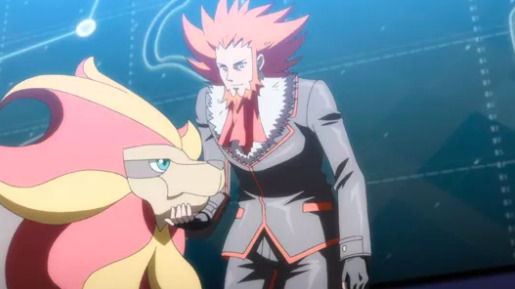
For third, let’s discuss the anime.
The third reason that Lysandre’s so scary is due to his relationship with Alan in the animated version of XY/XYZ/TSME.
Throughout the duration of the show, Lysandre is very much a puppet master moving all his pieces into place. One such puppet is young Alan, a trainer who he’s manipulated and set into place like a toy on a string.
The first time Lysandre meets Alan, it’s actually kind of terrifying to think about. He meets Alan in the midst of ruins, battles him, defeats him, and then coaxes Alan into becoming his minion. Not only that but he uses Alan’s lone role model against him - using Alan’s love for Professor Sycamore to drive him away from the man and into Lysandre’s care only.
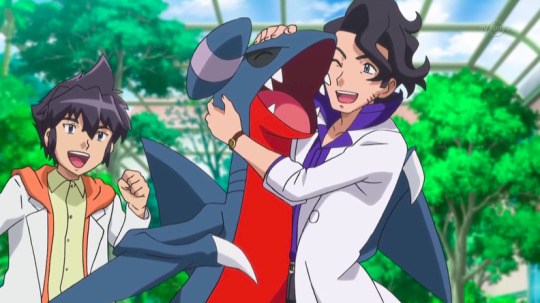
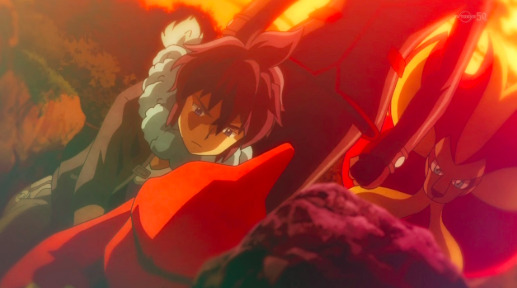
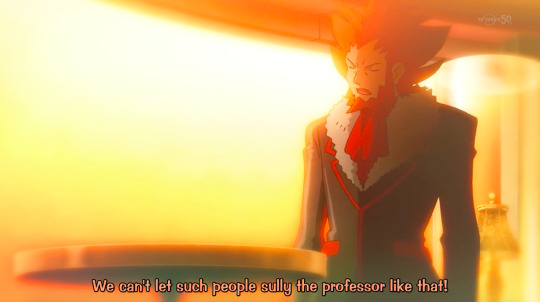
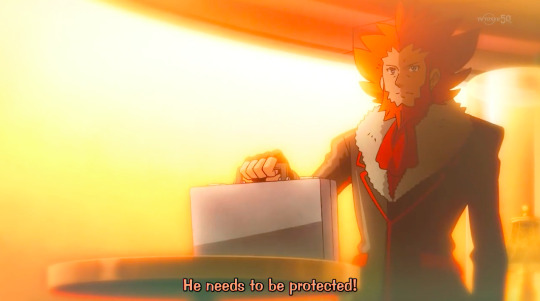
Lysandre abuses Alan’s trust in him as an authority figure and makes use of that trust in his favor. He uses Alan as his assistant in his plot, letting Alan think that he is doing good without telling a single lie to the boy. The man uses Alan without remorse, depending on his skills and prowess while also treating him as disposable if he becomes “weak” (as mentioned in TSME episode 4 when Lysandre notes “I don’t need weaklings”).
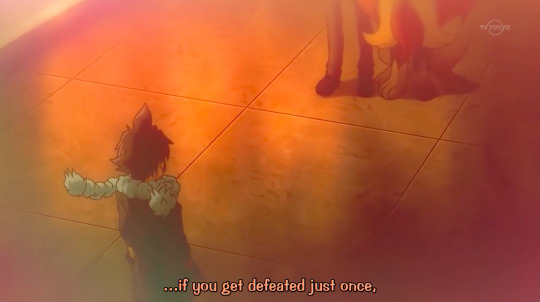
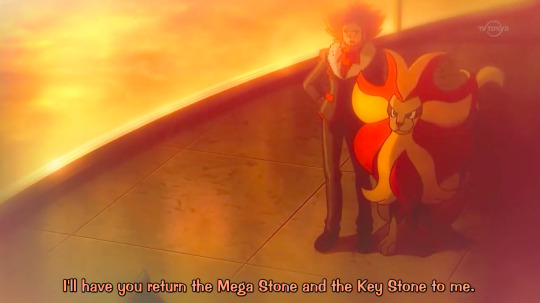
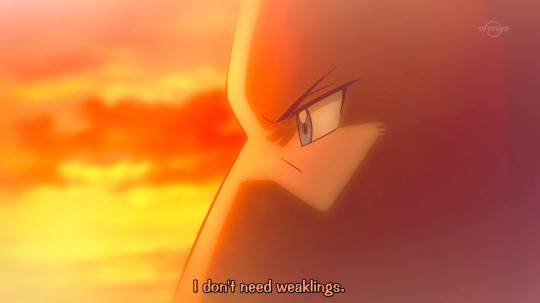
Furthermore, when Lysandre recognizes Alan’s fondness and guilt over Manon and her Chespin’s condition, he uses that as a tool to get Alan to continue collecting energy. While Alan is hurting over how his actions have caused his closest companions pain, Lysandre weaponizes Alan’s feelings by feeding him tales of “how he can save Chespie” if he just “collects Mega Evolution energy”.
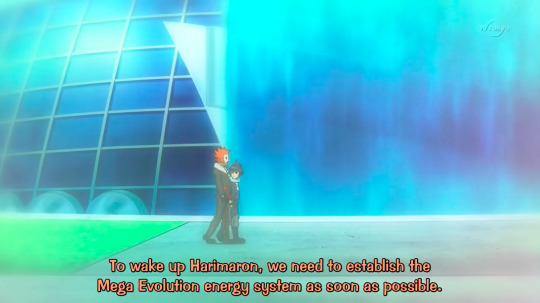
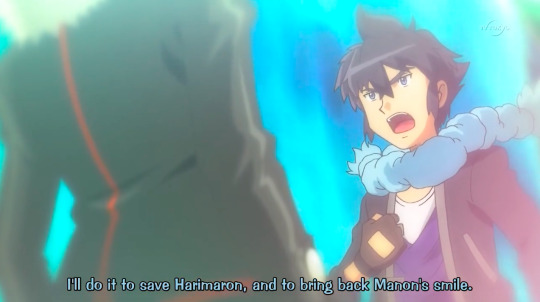
It’s terrible and it’s downright horrifying. Even as Alan’s obviously breaking down, Lysandre’s first thoughts are not to help the boy but to use Alan’s feelings for his own personal plans. He cares little for how Alan or Manon actually feel and, instead, chooses to use their unfortunate situation in a way that only truly benefits him.
It’s cruel and malicious, selfish and yet cold-hearted. Lysandre’s relationship with Alan is honestly really toxic. He controls Alan, cuts off his closest connections, and weaponizes said connections to put the boy under his control.
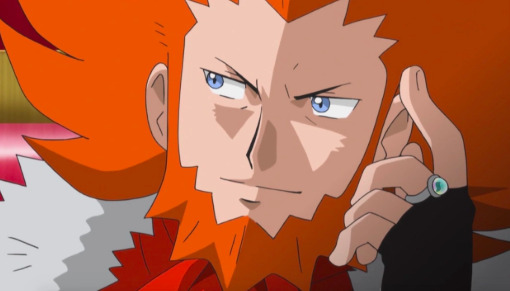
For the fourth reason for why this man is scary it’s because Lysandre thinks he’s in the right and doesn’t think himself wrong. Lysandre’s goals, though seemingly flimsy in design and terrible in the game’s execution, get established in the anime as something almost...sympathetic. In the anime, though it’s only brief, Lysandre explains a little bit of his reasoning for his actions: a reasoning that I will paraphrase here to make sense for the context of his overall character.
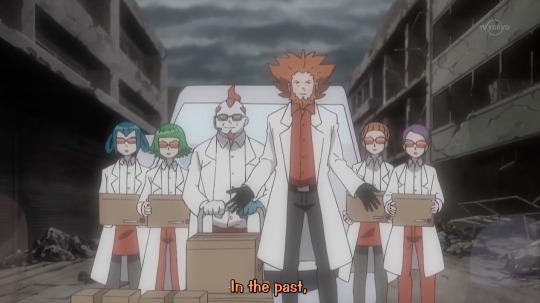
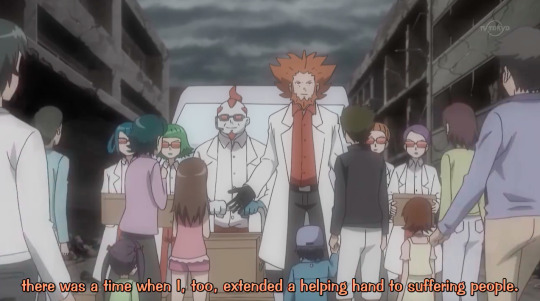
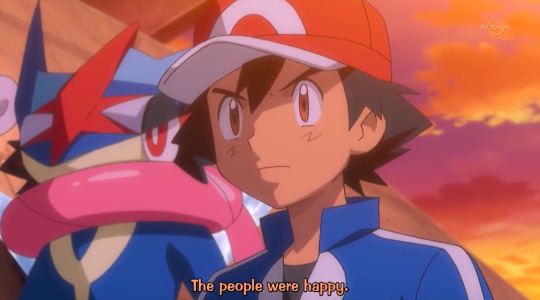
His explanation is that he wanted to help people who were suffering, lending them his time, money, and charity in order to help them. At first, he was thanked and appreciated and everyone loved him for it. This was something that Lysandre arguably considered “beautiful”.
Over time, however, he noticed something changed in the people he helped. They became greedy, wanting more and more of whatever he could provide. He was treated horribly because he could not provide what the people wanted. This, in turn, opened his eyes to the “ugliness” of humanity. He grew bitter, grew spiteful of the people he helped because they saw him as something akin to a tool rather than as a hero.
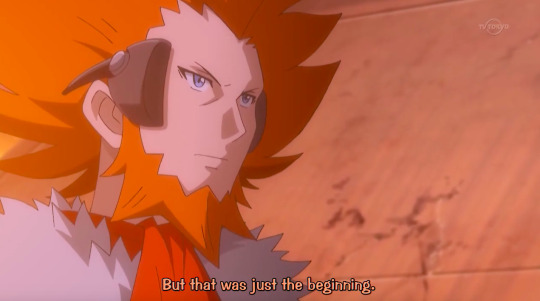
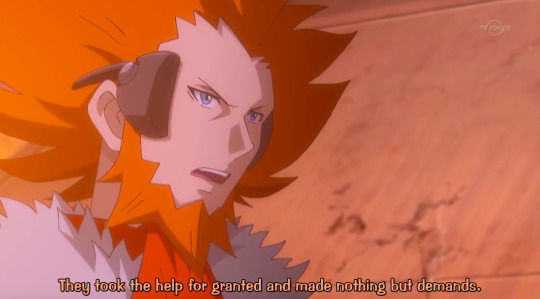
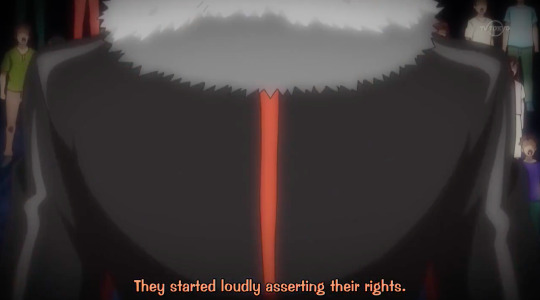
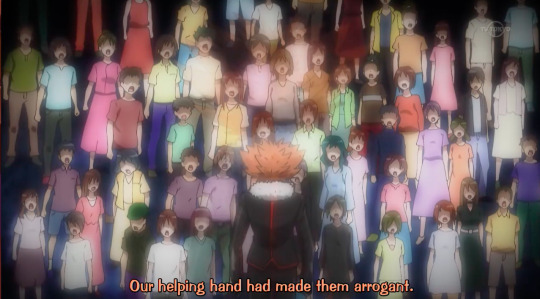
This doesn’t explain how he developed genocidal tendencies, of course, but it does give a realistic background story that I can believe and yet somehow sympathize with. Lysandre wanted to help people. But, in doing so, he made them greedy. They wanted more from him, wanted him to do more things for them because of their “rights”, and this greed ultimately makes Lysandre start to snap.
Moving on, I think a lot of the inspiration for Lysandre’s deeply off-the-rockers and genocidal maniac transformation lies in the real fictional story of “The Picture of Dorian Gray”.
In said story, the main character - Dorian Gray - comes to be inspired by the views of a man known as Lord Henry Wotton. Lord Henry believes fully in beauty as the only thing being worthy of being pursued in life. Taking up this view, Dorian Gray wishes that a painting of himself would age in his place so that he can pursue nothing but beauty and sensual fulfillment.
Taking this (very short hand) explanation of the plot in association to Lysandre, I think there’s a connection here. Dorian Gray, upon becoming smitten with the idea of endless beauty, seeks to keep himself beautiful forever. And Lysandre, who’s views of the world have warped into ugliness, seeks to pursue that beauty, wanting to rid the world of “ugliness” (human greed, “unworthy people”) so that he can keep the "beautiful” all around him (the “chosen ones”).
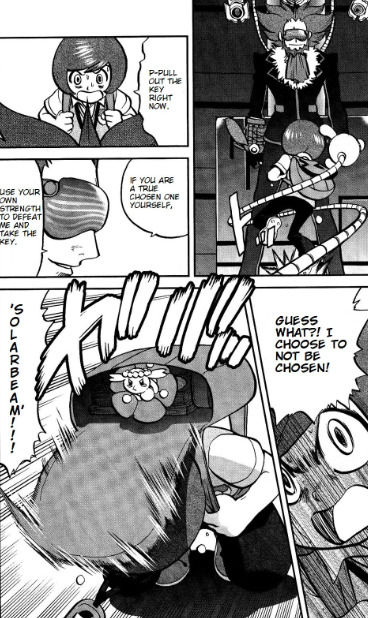
This ties back into the story’s themes of life and destruction.
Lysandre seeks life to keep himself and the “chosen ones” beautiful, to keep Kalos looking as pretty as he feels it should.
But, Lysandre also seeks destruction (or, if you’re like me, death) and wants to rid Kalos of its impurities (people who are “consumed by their greed” and “unchosen” just like members of Team Flare or people who fail to realize what beauty means).
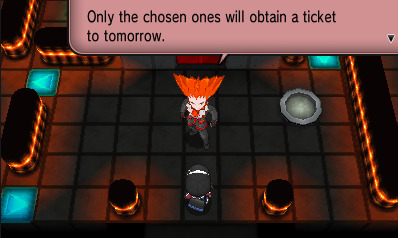
And, while pursuing the beauty of Kalos, he’s created such a mindset that only HE is in the right. He is the only person who realizes that Kalos is losing its beauty and, therefore, it’s up to him to make the world beautiful.
This is further pronounced in the XY manga. There, the ugliness of humanity is further brought up in the way the Kalos region reacts to tragedies. When a whole town is destroyed and left in shambles, those who did not experience the tragedy “shake it off” and “remain smiling in their day to day lives”.
There’s a certain kind of ugliness present in this scenario. The people of Kalos who weren’t involved in Vanivelle’s destruction live on happily. They smile and carry on their day-to-day lives while ignoring the suffering of others. This shows humanity’s weakness: humans do not care for things that don’t concern them personally. It’s a gut punch kind of message because it’s honestly kind of true. Until something impacts a person personally, they won’t care for the misery of others and, instead, choose to go about their merry way while another person suffers the consequences of things like poverty, famine, war, etc.
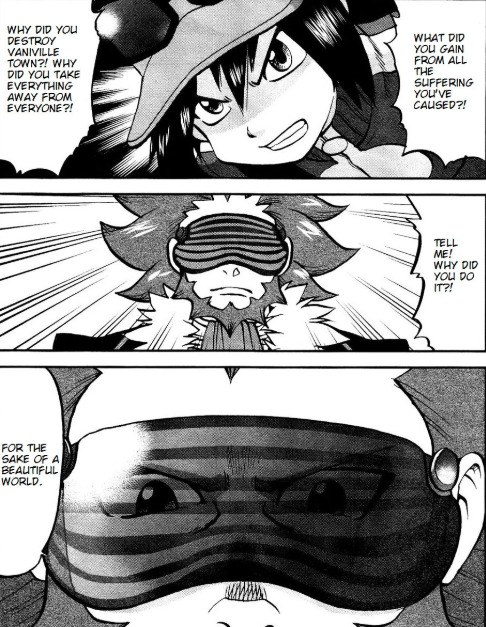
And, in a way, it kind of makes you think Lysandre is right to want to retain beauty and to destroy anything that messes with that ideal. If someone isn’t beautiful - if they’re greedy or selfish or unsympathetic to the pain of others - than you kind of understand why Lysandre would want to get rid of those kinds of people.
This is what makes Lysandre scary: you can sympathize with and even understand his thought process on a deeper level. He’s a genocidal maniac who’s too obsessed with beauty, yes, but there’s an underlying understanding of why he likely ended up the way that he did.
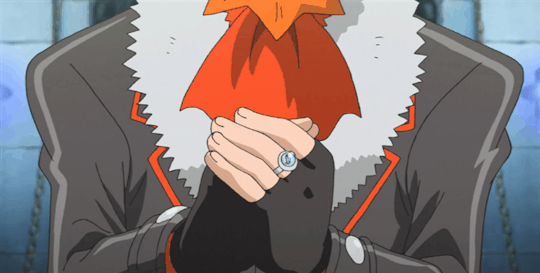
In conclusion, Lysandre is actually legitimately a terrifying villain and if he was a real person we’d all be really scared of him. He’s charismatic and manipulative and holds a lot of power in his hands. He can influence people and has control over how a lot of people as a result. His obsession with beauty, with correcting the path of humanity for its greed and impurities, not only reeks of real-life historical implications but also of realism too.
Lysandre’s the kind of villain you would expect to see in real life, someone who, if stripped of his Pokemon-verse significance, would easily exist as a person in the real world. He’s cunning and knows how to take control. Not to mention that he’s rich and the kind of person who could easily hide under the kind facade of charity. Lysandre is a dangerous man, far dangerous than any first glimpse of him might suggest, but he wields power like a sword and has the ability to determine between life and death at a moment’s notice.
#pokemon#Lysandre#Professor Sycamore#Diantha#Malva#ngl reading the XY manga#playing the games#watching the anime and the generations specials#has all made me realize that Lysandre is actually really fucking terrifying#and he's actually kind of a realistic villain in that it'd actually be possible for him to exist in the real world#and fuck shit up this badly without Pokemon around#my respect for Lysandre has shot up a lot because of the anime version of him tho ngl#never expected that the anime would make me love Lysandre#but thanks anyways anime#hello my Chandelier and I like to talk about Pokemon
40 notes
·
View notes
Text
Letter to Rebecca Moseley
Ashbury, 19 July 1887
To: Rebecca Moseley, 1 Old King’s Way, Caladon
Rebecca,
I hope this letter finds you well, and I also hope that you remember how to read this. I have also enclosed a similar message for your father.
[The rest of this message is encoded in a series of pictographs, essentially Wingdings.]
Dearest sister, I apologize for the coded message. Though I personally have no more need for subterfuge, I’m sure that Dad would appreciate the gesture, given the sensitive nature of some of the things I plan to tell you.
I’m sure that at this point, you’re aware that I’m alive. I survived the crash of the Zephyr. I’m sorry for any grief I may have caused you before word got back to you. You were the only person who knew I’d left on the Zephyr initially, and I’m sure it wasn’t easy dealing with the aftermath when it crashed. I should have written you, but unfortunately, circumstances prevented me.
You see, the crash of the Zephyr was just the beginning of the convoluted mess that I find myself finally nearing the end of. I found myself thrown unwillingly into a plot so inconceivable that you’ll probably think me mad if I tried to tell you all of it. But, given that this may very well be my last communication with you, I feel that I can risk you judging me as mentally infirm in addition to being physically infirm.
The Zephyr didn’t crash from mechanical failure. It was shot down in an effort to kill one of the passengers: a dwarf named Stennar Rockcutter. The reasoning behind this treacherous murder plot is even stranger. You see, Stennar was a member of the Black Mountain clan of dwarves, a clan that disappeared 60 years ago after Gilbert Bates revealed mechanical plans for his patented steam engine based on their own to the public. The cause of the clan's disappearance? Abduction. A group of Dark Elves (elves who defected from the main body of elves after the Age of Legends), masquerading as emissaries from Quintarra, lied to the leader of the dwarves, stating that Bates’ inventions had led to the destruction of uncountable elven forests and that the Black Mountain Clan was responsible for the damage, as they had given Bates the plans. They demanded that the clan be banished to the Isle of Despair, a prison island off the coast of Ashbury. As it happens, the Clan wasn’t banished to the Isle. They were banished to the Void. Yes, that Void. The same one that people tend to go to when they die, according to the Panarii. You know, the funny humans in robes that we used to see scurrying around Caladon? Those Panarii. I’ll be touching on the topic of the Panarii again in a moment. They’re pretty important to this story. Anyway, the dwarves were banished to the Void so that they could build some sort of device to break an individual stuck in the Void out. The individual in question? None other than Arronax, the villain of the Panarii holy book. See? I told you I’d get back to the Panarii. It turns out that the Panarii actually prophesied Arronax’s escape, and in their prophecy it was stated that their god, the elf sorcerer Nasrudin, would return and fight him, defeating him once and for all.
At this point, you’re obviously thinking two separate thoughts. First, that I’m insane and spinning conspiracy theories. This… is a fair assumption. Second, you’re probably wondering what any of this has to do with me, and why I didn’t just come home after the crash. I thought endlessly about doing just that over the last two years. The problem was that I and the other survivors of the crash were erroneously identified as the reincarnation of Nasrudin. A young Panarii monk, Virgil, told us that because we had survived the fiery crash unscathed, that we had been “reborn on wings of fire”, just as the prophecy stated for Nasrudin. We tried to debate the validity of that statement, but Virgil's mentor, the Elder Joachim, agreed with him. Even the Dark Elves seemed to think of us as a new potential threat, as well, sending waves of assassins after us from the moment we clawed our way out of the wreckage. Admittedly, in their case, they probably considered us a problem due to our brief conversation with Stennar before he passed on from the injuries he’d sustained in the crash. From that point on, my fellow survivors and I have had no other option than to unravel the plot that I spun you above in an effort to figure out why everyone either thought we were a god, asked us to handle a difficult but relevant situation, or wanted us dead, all the while avoiding contact with our loved ones out of fear of you being used against us. However, as we worked to untangle the twisted knots of intrigue, we found even more complications.
First, the Dark Elves had been led to believe that the Device that they had kidnapped the Black Mountain clan to build would be used to break Arronax out of the Void. It turns out that Arronax was never in the Void at all! He lives, alive and well, off the coast. Now, before you exclaim “but wait!”, don’t worry. He’s not the bastion of evil that the Panarii made him out to be. We met him. He’s just a sad old man struggling with daddy issues. Magick was able to extend his life to the present day. You may ask why the Device was built, then. It seems that Kerghan, the terrible necromancer that had been banished to the Void for crimes against sentient-kind in the Age of Legends, managed to trick the Dark Elves into thinking that he was their idol, Arronax. The Device exists to break him out. It uses the souls of the dead stuck in the Void to power itself.
Second, the Device is ripping holes into our world. We’ve encountered many such rips and they allow the terrible creatures of the Void, demons, beasts and the like, to enter our world. The rips also destabilise reality, and if the current trend continues, there may be enough to end reality as we know it.
Third, the monk that originally clued us in to the Panarii prophecy has far more to do with the situation than even he initially realized. He left us a year ago, angry and depressed from the stress of the quest and of us, and ended up in one of the rifts… and therefore the Void itself. He encountered the Device, but since he was alive when he did so, it couldn’t use his soul for power. Instead it shattered it. The shards were able to retain sentience and some were able to escape. Saint Mannox, the man who wrote the Panarii holy text, and therefore the prophecy that pulled us into this mess, was one such shard. The Panarii elder who mentored Virgil and encouraged him to stick with us was another. All of them seem dedicated to engineering our involvement in these rather unbelievable events.
Fourth, it seems that the only way to stop the world ending and possibly save poor Virgil from the Device is to get into the Void and stop Kerghan. We have plans to do just that. Hopefully we’ll succeed, but there’s a very low chance that we’ll make it back out alive even if we do.
Rebecca, I’ve done and seen so much on this journey… and I don’t just mean the absolutely hairy series of unfortunate events that I just laid out for you. I roamed the continent. I got engaged and then (sadly) broke his heart. (Which, by the way, my ex-fiance is apparently in Caladon now. My companion, Thaddeus, mentioned to him that I have siblings, so… I’m sorry if you have a random new suitor.) I stood up to Councilman Babcock and (accidentally) made a rude gesture at him while dressed as you (which you probably heard about and I’m sorry if that hurt your reputation, though I know you and you probably thought it was hilarious). I was arrested half a dozen times. I met the king of the dwarves and the leader of the elves.
Best of all, I made friends. Real, live friends that aren’t related to me. Against all odds, I managed to fall in with a group of weird, funny, awful, lovely outcasts and… I have friends.Thaddeus, the human, is a fellow technologer, a practitioner of medicine, and possibly one of the nicest people I’ve ever met. He can be awkward and naive and frustrating occasionally, but mostly he’s just unflappably kind and the most loyal friend I could ask for. He’s known about Tarant as the Pervert of Tarant, but don’t listen to a word of it. He wouldn’t know a set of genitals if it bit him, He’s certainly no Pervert. Waltera is a quirky halfling who loves both love and other people’s stuff. Utvald was a half-ogre that traveled with us for a short time before settling in Tarant. Last we saw him, he was in a rather dangerous situation. I hope he’s okay. Pog the Garringsburg’s half-ogre joined us for a while, too. He seemed quite smitten with me, but he eventually found acceptance at the University in Tarant. Wolf is a Dark Elf (!!!) who defected from the rest. She’s exceedingly odd, constantly nude, and occasionally a danger to herself and others, but I find her more pleasant than I may let on. Her sister Zan also travels with us, and she’s the calm, rational counterpart to her sister. She and I are of a like mind on many matters and I appreciate her greatly. Straf is… well he’s Straf. He was an elf, but thanks to a series of magickal shenanigans, he’s now some horrible salt golem/dragon hybrid. Don’t ask how. I really can’t explain it. He’s an awful person, a loudmouth, a bigot, and quite possibly the worst person I’ve ever met… But he’s also loyal and has saved my life more times than either of us would care to admit. Magnus, a dwarf, is intelligent, a fine craftsman of armor and weapons. He’s kind and just the right level of sarcastic and is also quite handsome, if I do say so myself. And last, though certainly not least, was our dear friend, Virgil. He was sweet, kind, and never missed an opportunity to be helpful. He could be surprisingly strong-willed when he wanted to be. He wanted to rise above his childhood of pain and poverty and make a difference in this world. Unfortunately, we pushed him to the breaking point. I miss him keenly, Rebecca. I hope we can save him.
Lastly, before I sign off on this letter, I have some news involving our father, Doc, and the reason I left. I’m sure, given all the other nattering on that I’ve done in this letter, that you thought I’d forgotten my goal. I didn’t. I found out exactly what happened to Doc. He’s still alive, Rebecca. Dad didn’t kill him, and he didn’t die of natural causes. He’s alive. Dad had to fake his death to protect him. It seems that Dad is the exact opposite of what I thought he was. He’s not a callous businessman exploiting a race of people for his own benefit. He’s helping them. He’s saving the half-ogres from the other gnomes. The Industrial Council is forcibly breeding half-ogres for use as unpaid labor. Dad knows and has been quietly trying to stop them. I met with him a few weeks ago and discovered the truth, after I had located and destroyed the facilities at one of the breeding colonies. Dad kept everything from us because he wasn’t sure he could trust anyone, including his own children. That made me angry, at first. After all, I had been pretty open with him about my views on the subject of half-ogre subjugation. Yet, he let me run off into danger that he was apparently fully aware of, given how much he knows about my exploits. I thought it was short-sighted or selfish. I thought maybe he was just doing it for the glory. But the more I think about things, the more I realize that that’s not the case at all. He didn’t think he could trust us. He put the needs of the many, many half-ogres over the needs of us. Yes, he let me amble off into danger. I might have been hurt or killed, but honestly, if I’d proven untrustworthy and he had told me, I could have doomed hundreds, possibly thousands of half-ogres. As much as it hurts, he was probably right. Their safety outweighs mine. This realization makes what’s to come in my own quest more bearable. I’m willing to walk into the Void if it helps save everyone else. The needs of the many outweigh the needs of the few.
But, sis, I do have one need of my own to fulfill before I go. We have to acquire one last thing before we’ll be able to take on Kerghan in the Void, but once we get it, we’ll head to Roseborough to be sent to the Void. It’d like to see you before I leave. If you head to the Roseborough Inn after you get this letter, we may be able to see each other before I go. If you don’t wish to do so, then I understand, though.
Love, Dyna
1 note
·
View note
Text
LIFAD Studio Report.
A report which was posted on the official site in 2009. It’s very long so I’m posting it under the cut, but it’s an interesting little look into Rammstein’s studio life.
Found on Ramm Wiki.
Journalist and radio reporter Marion Brasch visits Rammstein during the recordings of LIEBE IST FÜR ALLE DA in California. Here is her report. Jack London was in this area. The last few years of his short life had been spent up in a ranch on the Sonoma Mountain in California. All he sought there was "A peaceful place to write and exist in nature – These things that pass us all by, though so many aren’t even aware of it". What Rammstein is seeking here isn’t so different. However, while Jack London came here to grow old, for Rammstein it is simply one stop on the way to completing their new album. For 6 weeks they worked here on their songs. Far away from home, no family around, no distractions, or anything else to seduce them away from their work. Of course they allowed themselves a few essential pleasures – good eating, a few good movies, refreshing dips in the pool, games of tennis, and a flight to see the Nine inch Nails concert in Sacramento.
Originally, Rammstein had wanted to record in Los Angeles. "L.A. has a good energy. Everybody is after something. It’s racy, fast and hard." says Paul. Schneider was also very keen to try the L.A. experiment. People always have their perfect locations, be it in Malta, Spain or South Africa. Los Angeles could have been a new experience…it didn’t happen. So Schneider just recorded his drums there, and then relocated to the extreme contrast that is the beautiful mountain in Sonoma Wine Country. A studio complex in the style of a country house, complete with fireplace and cook. Paul: "Its so friendly and tranquil here, actually far more peaceful than we needed for this album. But the studio was booked and we will go though with it. That we can do." Richard talks about the Rammstein group dynamic, which is extremely strong and dark. Indeed, while a good thing, it can after a while be too much and sometimes destructive. That means that it has become important, from time to time, to find a place where one can step back a little, to escape the Rammstein magic. Flake would also have loved to record the album in Grunau: " America isn’t really my thing".
To get to this point, on this mountain, was a long journey. Rammstein had taken time off since their last album "Rosenrot" and the long gruelling tour. For more than a year each of them could lay back and do what they want. No responsibilities, no phone calls. A kind of Sabbatical. Rammstein as a band didn’t exist during this period. Neither from the outside nor from the inside. It wasn’t till after seven months that Flake first noticed that he had time off: "I had just as much to do as before, just not with the band. Paul fell into the famous Black Hole, and came to the realisation that he has done never done anything in his life. Schneider at one point got the feeling he wasn’t part of a band anymore: "I asked myself if it was going to continue". A thought that on one side unsettled him, though he also learned that a life without Rammstein was more than possible. Richard already knew that, and worked in New York on his solo project "Emigrate", Olli got married and enjoyed life. And Till? Till sat in his room and thought about burning angels.
At midday Robin arrives. Robin is the cook, though her main job is as a jewellery designer. She has worked for Prince, and on the TV show "friends". Now she works for Rammstein. Has she heard their music? No. She doesn’t need to know more about the band than what she can already see. "These guys are so great!". Sometimes she hears a few shreds from the studios and it sounds very exciting. "And Till is really an artist!". In about an hour of chatting and kitchen magic a complete menu for 12 lies on the table. 12 people not stingy with their compliments, who like to tease Robin "…And so easy to please!"
Lunch and Dinner are the set fixtures in the daily schedule. There we all sit together. For breakfast everyone has to take care of themselves. And then its to work. Along with Rammstein came the producer Jacob Hellner, and engineers Ulf Kruckenberg and Florian Ammon (Who just completed working with U2 on their new album). The studio comprises three workstations: In the main studio sits Jacob, recording the guitars and the vocals. The second station is the bandsystem for bass, keyboards and so forth. Finally, the third station, where the various takes from Schneiders recordings in L.A. are sorted, and the best sent to the main studio. "Like a factory" says Paul, "Some kind of assembly line." Jacob Hellner has produced all of Rammsteins albums. He knows the band, knows what makes the guys tick. "Making a record, is mostly a chaotic process, but Rammstein are very structured – that makes it easier". Only the continuous discussions in the band are occasionally stressful. "Rammstein is a never-ending conference". That’s why he prefers to breakfast alone in the producers living quarters, a little removed from the studio complex. There he chews on his cornflakes, looking down upon the steaming valley. It rained during the night and has become chilly. The electricity has cut out again. That’s normal here however, and no one is disturbed.
Flashback: When the year long timeout came to an end, the band met with their manager Emanuel Fialik on a houseboat to cruise, and to think about how things should progress on the good ship Rammstein. "It only took one day for me, until it felt like we were never away" remembers Flake, "The same silly jokes, everyone back to their old behaviour and ways": Paul uses this analogy: "You smoke, then you quit, than you begin again, and your smoking again. It’s as if you never stopped". And then the discussion: New Album or first a tour? The opinions, as ever, were split. Schneider: "I thought it would have been good if we, to start off with, went on tour. For me, a band only really exists when they are standing on a stage. Its then that the band-feeling is there, and that’s also for me where the real meaning is: Making music together while other people listen." But, the Rammstein system is democracy, and the final decision: Studio.
Then followed a sometimes agonizing process, which Richard refers to as the "Dark times". Olli sees these times first and foremost as positive: "We must learn again, to view ourselves as a band. That was our task, and that helped us on." They went to the practice rooms, played together, collected ideas, recorded a few demos – All this takes us another year further forward. One whole year that the band needed to grow together again. The work, however, was no easier from then on, quite the opposite. The songs that were already finished, were worked upon over and over again. In different locations, under different terms. "And always beginning from the beginning" Recalls Paul. A painstaking process, putting the mood of the band under extreme pressure. And Till? Till, in spite of the rain and cold, swam his lengths in the pool.
Richards’s guitar is being recorded in the main studio. Flake stands behind Jacob at the console and has a couple of ideas: "Everyone has their favourite song, that touches his heart especially, and therefore they engage with it perhaps a little more than the others." And Jacob describes his job: "I mix parts together or over each other. How the structure looks at the end, nobody knows yet. Music has a mind of its own. When you think you have understood its ways, you’ve made a big error. Music doesn’t know any rules." Working on the songs is one thing. At the same time, here in California, there is much thought about the tour (the stage and the show being just as important as the music for Rammstein). Rammstein is an all encompassing artwork.
The manager Emu comes over. A band meeting has been arranged for after dinner. A tour before the album or afterwards? Six people, six different opinions. The Rammstein democracy is straining. Sometimes they all talk over each other. Paul: "The trick is, to learn to propose things positively, and at the same time not get angry too quickly, or snap, when your thoughts are rejected. When one of us claims more rights than a sixth, than real trouble can erupt." Rammstein are a natural biotope, and one that functions…
Richard sees it thus: "The brilliance of the band comes from no individual, instead it results from a chemistry between all parts." A chemistry that follows no harmonic principles, in fact to the contrary: It’s precisely the friction that generates the specific individuality that makes Rammstein what it is. Flake: "One could compare Rammstein to ‘Sechse kommen durch die ganze Welt’ (East German cartoon about group of kids, each with different talents, and their adventures): One is a fast runner, one has great vision, one is the strongest. And me, well, maybe I’m the guy that can spit really far…
Jacob talks about the great Rammstein-machine: "Every idea must go through it, and what comes out at the end, is Rammstein-music". And Till? Till sings "Bin nie zufrieden, es gibt kein Ziel, gibt kein Genug, ist viel zuviel…" The song is called ‘Mehr’ and has an intimate sound. Whether it will be on the album or not, isn’t yet decided. It is to be released in the autumn, than Mehr (more) happens. Marion Brasch.
#Rammstein#LIFAD#Till Lindemann#RZK#TILL#Lindemann#Christoph Schneider#paul landers#Oliver Riedel#Richard Kruspe#Christian Lorenz#Flake#Flake Lorenz#schneider
90 notes
·
View notes
Text
Highlights for Neoreaction a Basilisk
Angela Nagle’s appalling Kill All Normies, which takes the jaw-droppingly foolish methodology of simply reporting all of the alt-right’s self-justifications as self-evident truths so as to conclude that the real reason neo-nazis have been sweeping into power is because we’re too tolerant of trans people.
This brings us to our second relatively uninteresting question, which is what to do about the alt-right. In this case the answer is even easier and more obvious than the first: you smash their bases of power, with violent resistance if necessary. If you want a more general solution that also takes care of the factors that led to a bunch of idiot racists being emboldened in the first place you drag all the billionaires out of their houses and put their heads on spikes.
The lethal meme, known as Roko’s Basilisk, used the peculiarities of Yudkowskian thought to posit a future AI that would condemn to eternal torture everyone from the present who had ever imagined it if they subsequently failed to do whatever they could to bring about its existence.
I want to be clear, with all possible sincerity, that I love the braggadocio here. I want what he is selling. Yes, Mencius, savagely tear away the veil of lies with which I cope with the abject horror that is reality and reveal to me the awful, agonizing truth of being. Give me the red pill. The problem is, once we get our golf ball-sized reality distortion pill home, put on some Laibach, and settle in for an epic bout of Thanatosian psychedelia, we discover the unfortunate truth: we’re actually just huffing paint in an unhygienic gas station bathroom. Jesus, this isn’t even bat country.
By “crap,” of course, I do not mean “wrong.” Rather, I mean obvious, in the sense of sounding like the guy at the bar watching the news (probably Fox) and muttering about how “they’re all a bunch of crooks.” Liberal democracy a hopelessly inadequate and doomed system preserved by a system of continual indoctrination? You don’t say.
And this really is stunningly weird in the context of all his red pill rhetoric about the corrupt horrors of liberal democracy. Because while there are a great many obvious critiques of contemporary society, “there’s just not enough respect for profit” really doesn’t feel like one of them.
With this, we have a genuinely tricky moment, simply because of the sheer and unbridled number of unexamined assumptions going on here.
But all the same, if you’re going to talk about suppressed ideologies that oppose the interests of entrenched power, you’ve really got to talk about the original red pill: Marxism.
It is tempting to suggest that Moldbug is a failed Marxist in the sense that Jupiter is a failed star, its mass falling tantalizingly short of the tipping point whereby nuclear fusion begins. Over and over again, Moldbug asks questions much like those that Marx asked, and his answers begin with many of the same initial observations. But inevitably, a few steps in, he makes some ridiculously broad generalization or fails to consider some obvious alternative possibility, and the train of thought fizzles into characteristic idiocy.
This sort of “the world can be saved if only everyone listens to me” narcissism belongs in the genre of fiction, where it can accomplish something, and not in the visionary manifesto, where it only reveals its own impotence.
That is not to say they can get away with being wrong, at least not straightforwardly so, but it is to reiterate that the key problem with Moldbug, Yudkowsky, and Land is that they are in key regards uninteresting—that they offer dull and unsatisfying answers to their most compelling questions, of which “hang out with a bunch of racist nerdbros” is merely the worst.
Terence McKenna’s suggestion that DMT is an alien intelligence’s attempt to communicate directly with the human brain
That’s the whole point of the right to exit—a final and decisive rescue of individual liberty at all costs. But exiting requires that people stay behind; if we all go, we’ll just have to storm out again. The entire point of the project is to separate the wheat from the chaff.
He posits that in this situation the “absolute limit to our ability to adequately understand the world at all” becomes increasingly relevant, and observes that this is a frequent theme of both philosophy and horror.
The truth is that, despite Land’s evident fascination with them, the bulk of neoreactionaries are not people one would want to have a beer with, and there’s not a great case for reading their books either.
Yudkowsky isn’t just running from error; he’s running from the idea of authority. The real horror of the Basilisk is that the AI at the end of the universe is just another third grade teacher who doesn’t care if you understand the material, just if you apply the rote method being taught.
Hauntology comes from within us; the Weird from outside.
The red pill, pwnage, and for that matter the horror reading, monstrous offspring, and Satanic inversions all follow the same basic pattern—a sort of conceptual infiltration of someone’s thought in which their own methods and systems are used against them.
It is, after all, the great one-liner critique of Mencius Moldbug: he’s exactly what you’d expect to happen if you asked a software engineer to redesign political philosophy. And crucially, Moldbug basically agrees with it—he just also genuinely believes that the Silicon Valley “disruptor” crowd would be capable of running the world with no problems if only people would let them.
Which is to say, Satan opens by negging Eve, accusing her of looking at him “with disdain, Displeas’d that I approach thee thus, and gaze Insatiate, I thus single, nor have feard Thy awful brow,”112 which may be the earliest instance of telling someone they have resting bitch face.
In the face of an ecologically brutal planet, the guys with guns and tribal loyalties are a depressingly compelling bet to stick around.
With Moldbug the sense is overwhelmingly that empathy just never crossed his mind as something to factor into his design. He flat out didn’t think of it. Yudkowsky, on the other hand, thinks about it a lot and cares very deeply about it; he’s just incompetent at it.
The result of this approach is that Yudkowsky, without really meaning to, tends to look at everyone else in the world as inefficient Eliezer Yudkowskys instead of people as such.
Moldbug, Yudkowsky, and Land don’t just “do poorly” with empathy—they represent the most visible and explicit edge of a Cathedral-scaled system of values that casts the desire to listen and try to understand people who are different from you as anathema to reason itself.
This forces us to consider white culture as a set of perpetual ruins—as something that has always been lost, and that can only be apprehended as a tenuous and incomplete reconstruction.
No, what’s really notable here is Moldbug’s doe-eyed certainty that such a thing as an absolute truth service could be built; that there is a general plan of action so self-evidently compelling that if he only expressed it properly everyone would immediately flock to his side. In short, after thousands of words railing against the Cathedral for secretly being a religion, he’s accidentally reinvented religion. And then lost the holy text. You couldn’t parody it better.
They have that marvelous feature of the best gods: perfectly answering a question you didn’t know you had.
And a few, such as Ahania, are genuinely breathtaking in their scope: a pleasure goddess representing intellectual curiosity who is bound in a Persephone-like structure of death and rebirth is a metaphysical/literary construct to rival Milton’s Satan, and one Blake barely scratches the surface of.
And it’s hard not to suggest that the world would be a better place if Yudkowsky had stuck to children’s literature for adult geeks as opposed to starting a weird AI cult that derails efforts to curtail malaria.
And while Gamergate usually doesn’t have a product to sell in quite the same literal way, it’s worth noting how, for instance, two doors down from them is someone like Stefan Molyneux, whose output amounts to 30-60 minute PowerPoint presentations consisting of a by-now familiar sort of low-content dissembling, and whose business endgame is literally a cult.
The Gamergate narrative has always required a vast quasi-conspiracy to function, some story whereby feminists or SJWs or cultural Marxists exercise near-complete control over video games and video game journalism.
Not even a monoculture then—an anticulture, with Vivian James ironically its perfect representation. It’s a desire to befit their worldview, its adamance dwarfed only by its fundamental emptiness. There’s nothing there. There’s never been anything there.
And Gamergate as a whole is scarcely better. It’s always been notable for its near-complete lack of actual discussion of videogames.
More interesting is where his basic inclination towards racial stereotyping originates from: the material realities of New York real estate, its patterns of historical ethnic migrations geologically stratified across the city’s expansion.
He might have had a name. But then he literally built a six-hundred-and-sixty-six foot tower to which he offered up that name, sacrificing it upon its black altar such that the building became a titanic sigil of the sixteenth Major Arcana of the Tarot of the Golden Dawn, symbolizing destruction and ruin, with only the remnants of the man whose name it ate living within the rotting heart of its penthouse.
He sold his name, yes, but what did he get out of the deal? The answer, simply put, is what he would hereafter treat as his most valuable asset: his brand. In short, he became a creature of pure image.
But it also includes the raw allostatic load of living under his rule; the basic psychological wear and tear of waking up every morning in a post-fact world dominated by a bullying narcissist. The act of living in a world where the basic validity of your identity is contingent and perpetually imperiled, where the very definition of “fact” is in dispute, and where a brutish logic of dominance and humiliation pervades the entire social order.
Individuals can act all they want. They won’t make the end of the world go away, any more than their freedom to quit work can make them free to not starve
It helps that one can be against today’s racist wars—though not on the grounds of anti-racism, except of the most specious variety—while quietly accepting and utilising the racial inequities inherited from the racist imperialism of the past. As usual, reactionary thinking is dependant upon amnesia.
It admits that value is a mental construct, but one that is ‘real’ because it has a real social basis and real social effects. Value, for Marx, is neither a thing nor an essence, neither quality nor spirit. It is a social reality because of what humans actually do.
Theoretically detached from the objective and the material, and connected to business as a client, mainstream economics has become—to a large extent—an ideological discourse.
This is how Moldbug and Thiel’s view that democracy is incompatible with liberty arises. A democracy is a society in which the mass of the population—who are, by definition, mostly without property—can shape policy so that it curtails the freedom of the propertied to make their choices. In a free society—by their definition—the capitalists get to make their choices unfettered.
For the Austrians, democracy is to blame for capitalism going into crisis. Democracy breeds special claims by people who are not really concerned with making the choices that regulate the economy. The people without a big stake—the masses��thus destabilise the system.
This is the so-called Austrian ‘Business Cycle.’ Boiled right down: crashes and recessions happen because central banks set interest rates too low. Easy credit results, which screws up market signals. Loaners go crazy. Bubbles inflate and burst. Such lopsided production can only be remedied via letting interest rates rise to their ‘natural’ rate. In other words, the Austrian prescription is: let the crisis rip. It will be harsher but quicker. The only cure for god’s wrath is to wait for the plague to exhaust itself.
Opposition to democracy is entailed by the Austrian view of how capitalism works. Democracy is the rule of the ignorant and selfish public, and the state is their tyrannical arm. Moronic majoritarianism wields unjustifiable power over the propertied and the entrepreneurs who are, for Hayek for instance, almost promethean artists in their special sensitivity and understanding.
The logically consequent idea that emergency dictatorship may be necessary to preserve liberal society from democracy is in neoliberalism’s source code. Neoliberalism, contrary to myth, is an authoritarian ideology, committed to defending property and wealth by violence both physical and structural.
The leaders of Rothbard’s revolution would be the libertarians and the minarchists. The troops would be the masses, spurred to fight the elites. And the spurring would take the form of appeals to racism.
The disproportionate number of former-libertarians in American fascism is revealing because conservatives are far more numerous in America than libertarians, which suggests that libertarianism is statistically over-represented.
The Cultural Marxism conspiracy theory now espoused across the alt-right is a reiteration of what the (actual) Nazis called kulturbolschewismus, an idea central to Nazi dogma, about degenerate art and culture being manufactured by Jewish communists to undermine the unity of the German people. The resurrection and repackaging of this idea across a movement soaked in libertarianism is not surprising, because antagonism to socialism goes right back to the dawn of libertarianism, to the Austrian School’s foundational and self-chosen role as the intellectual foe of Marx.
People might not necessarily formulate their objections to the content of newspapers that way, but they’re nevertheless absenting themselves from daily exposure to one of the main means by which the ruling class produce ideology and public consent. This is at least as big a concern to the people running the media as the need to claw back profits.
In all of these cases, the strategy is to play on insecurities of young men in an age where there are mounting ideological challenges out there—especially on the Internet—to their untroubled social privilege. Coupled with the twin legacies of decades of neoliberalism—increasing ideological and political disorientation, and a future far less secure than that which faced their parents and grandparents at their age—such challenges can terrify the semi-privileged layer of young, white, middle class men, who enjoy all those privileges without also enjoying actual material security.
Reactionary politics once again takes advantage of having a wide batrachian mouth, both sides of which may be used for talking.
The reason actions don’t lead inevitably to goals isn’t because there are complex material structures of oppression that heavily shape people’s lives, but because we exist in linear time. Not only does Rothbard not connect time to what dominates it for most people in capitalist society—work—but hilariously, he doesn’t even bother connecting time to its ultimate horror and constraint, death.
To quote the monster directly: “Milton produced Paradise Lost in the way that a silkworm produces silk, as the expression of his own nature.” Marx would like all labour to be like that, and sees no fundamental reason why it shouldn’t.
It’s pretty clear that the Austrian School doesn’t even remotely care about this fact, but it doesn’t inherently contradict anything they say. But that is, in the end, the point, and one I’ve made before: they don’t care. That’s clear, in a sense, all the way back in the basic axiom, with its active foregrounding of the heroic individual acting upon the world, as opposed to the state of affairs that most actual people experience, which is mostly being buffeted around by various external forces, whether they be governments, history, or the class system. Indeed, “individual human beings are acted upon” would be every bit as justifiable an axiom as “individual human beings act,” if not moreso.
They have been hugging Marxism on the brink of the Reichenbach Falls for a century and a half, staring into its eyes, but have never really seen it.
Mises’ only invocation of courage is in the context of statesmen standing up to labor unions. Decency only comes up in the context of “laws of morality and decency.” And his sole mention of kindness is a complete and grotesque misunderstanding of the very concept as he declares that “the indigent has no claim to the kindness shown to him,” as if being unearned isn’t the entire fucking point of kindness. It is a conception of human action without a shred of concern for empathy – human action devoid of all humanity.
But the real reason for this is that, more than anyone else, Marx provided an alternative to the charade on which their entire philosophical edifice was constructed. He showed the need for the destruction of that which, to them, gives the world meaning—and a method by which it might be achieved.
Given that no small number of conspiracy theories are, in point of fact, anti-Semitic, any attempt to uncritically synthesize them will be as well.
Icke’s theory is much the same way. We know wealthy elites control our minds. Knowing they’re lizards (or, for that matter, Jews) doesn’t actually change anything. It is, to borrow a phrase, malignantly useless knowledge.
Not only does nothing follow from Icke’s conclusions, nothing follows within the argument itself. Icke does not so much lay out a case for the lizard people as blunder among vague associations, hoping that the aggregate of a bunch of extremely tenuous connections will somehow be persuasive instead of a discombobulated mess of shoddy research and sloppy reasoning.
The history of the world consists of a lot of wealthy assholes sleeping with each other and killing people. Changing up which assholes slept with and killed who doesn’t actually make much of a difference.
Ridiculous arguments, especially ones that recognize their absurdity, are capable of revealing things that do not follow obviously, if at all, from self-consciously serious approaches, but that are nevertheless true and valuable realizations.
So is his inclination to be skeptical of the “official” version of history. The value of this, to be clear, is not simply skepticism for its own sake (an approach that is just as likely to lead to things like climate change denial or creationism as it is to some productive insight), but rather the realization that, as the saying goes, history is written by the victors, and the standard version of history is inevitably the one that most flatters those in power.
It is not entirely clear why monstrous truth must take reptilian form, but just as the weird turns instinctively to tentacles and the hauntological inevitably drifts towards skulls, for some reason awful truth must take the form of a reptile, whether a petrifying basilisk or just a bunch of pan-dimensional aliens.
This is a leftist book, and so must engage in a circular firing squad at least once.
This set a pattern whereby trans rights were repeatedly employed by the gay rights movement as a bargaining chip—as the thing they were pointedly willing to sell out in the name of compromise, as they spectacularly did when lobbying for the Employment Non-Discrimination Act, which excluded trans people in every version that was brought to Congress prior to 2009.
Thiel’s vision of corporate success is blatantly just the Moldbug/Land vision of how authoritarian capitalism will save us from the Great Filter.
Rather, it’s that once you’re willing to question the basic fact of Thiel’s competence it rapidly becomes apparent that the only actual evidence for this competence is that he has a lot of money.
And his fascination with seasteading numbers him among the litany of people interested in micronations, which is such a rich vein of complete crackpottery that I’d hate to deprive you of the pleasure of Googling it. This borders on the investment portfolio you’d get if you gave David Icke several billion dollars.
Who would craft such a thing as the alt-right? Only a fucking idiot. What other answer were we possibly going to find? It’s been idiots all the way down. And so of course even its billionaire supervillains bankrolling world-conquering AIs, vampiric life extension, and Donald Trump are idiots. This borders on “A is A.” And yet for all its obviousness, it captures what is perhaps the key realization about the alt-right—one that’s been implicit through much of this book, but is worth making explicit as we come to a close: they’re stupid.
I do not suggest this to diminish their horror. Far from it: the essential horror of the abyss is stupidity. That’s why it’s an abyss. The unique and exquisite danger of stupidity is that by its nature, it is beyond reason. There is nothing that can be said to it, because by definition it wouldn’t understand. It is an ur-basilisk—the one terrifying possibility that haunts every single argument that has ever been made. It is a move without response, playing by no rules other than its own, which do not generally include any obligation towards consistency. It is, in its way, the only approach that can never lose an argument. And in the alt-right and its affiliates we have one of the most staggeringly vast nexuses of raw stupidity the world has ever crafted.
The post Highlights for Neoreaction a Basilisk appeared first on alper.nl.
via English – alper.nl https://ift.tt/2LPiKQ2
0 notes